3 The Arrangement Of The Biblical Covenants
A Summary Of The Teaching Video
Some of the points I cover in this teaching video:
Every biblical framework and theological system recognizes the prominent place given in the scriptures to the covenants. However, not every one agrees on the number, meaning and arrangement of the covenants.
Here are four of the most popular views:
Modern Dispensationalism—originating with John Darby in the early to mid 19th century, this system of teaching has become one of the leading views of 21st century Evangelicalism. It arranges eight covenants in “time-tight compartments”, each serving a primary and distinct role within a specific timeframe of history.
New Covenant Theology—originating with those who were dissatisfied with the arbitrary time frames of Dispensationalism, this school of thought is one of the more recent theological developments. It arranges six covenants in a “stair-case advancement”, each serving a primary, distinct and progressive role throughout the course of history.
Presbyterianism—originating with John Calvin of Switzerland and John Knox of Scotland, during the 16th century Protestant Reformation. Its devotees are self-acclaimed “Confessionalists”, believing the 1646 Westminster Confession of Faith is the perfect articulation for their understanding of the Bible. It arranges the covenants into three categories: (1) Three foundational covenants—Redemption, Works and Grace; (2) One universal covenant—Noahic; (3) Four administrative covenants of Grace—Abrahamic, Mosaic, Davidic and the New. It holds to the view that God made a conditional Covenant of Grace with Adam after the Fall, and that each of the succeeding four covenants are one and the same with this conditional Covenant of Grace, administered differently at various points in history.
Traditional Reformed Baptists—originating with the resurgence of Calvinism among the Baptist and Congressional churches of England during the 1950’s, under the influence of men such as Ian Murray and Martyn Lloyd-Jones, and publication houses such as the Banner of Truth. Its devotees are also self-acclaimed “Confessionalists”, believing the 1689 London Baptist Confession of Faith is the perfect articulation for their understanding of the Bible. In many ways, this group has more in common with the Presbyterians than the Baptists, and are therefore more accurately identified as Reformed Presbyterians. Its devotees share a similar view with the Presbyterians on the arrangement of the covenants (see above).
1689 Federalists—originating with the Reformed Baptists of the 1950’s, this school of thought claims to have “rediscovered” the covenantal views of those who compiled and wrote the 1689 London Baptist Confession of Faith. In recent years, the Reformed Baptists have been splintering and dividing, resulting in several distinguishable groups, each forming a separate branch of the Reformed Baptist movement. The 1689 Federalists is one of these branches. They often prefer to be called Particular Baptists, as they are passionate to reconnect with their Baptist roots, but are also unashamedly Reformed Baptists. They too are self-acclaimed “Confessionalists”, believing the 1689 London Baptist Confession of Faith is the perfect articulation for their understanding of the Bible. Although their arrangement of the covenants is similar to that of the Traditional Reformed Baptists, they believe the conditional Covenant of Grace was established on mount Calvary with the death of Christ, rather than the garden of Eden after the Fall. Henceforth, the conditional Covenant of Grace was promised in the covenants of the Old Testament scriptures, and realized in the New Testament scriptures. They believe only the New Covenant is one and the same with the conditional Covenant of Grace.
I do not belong to any of these groups, nor do I subscribe to their views on the biblical covenants.
Here is a summary of my understanding of the matter:
There are two spiritual and perpetual covenants—Redemption and Works; There are four earthly and temporary covenants—Noahic, Abrahamic, Mosaic and Davidic. As for the New Covenant, it is an explanation of the Covenant of Redemption (the parties and terms of this covenant are the electing love of the Father, the redeeming grace of the Son and the sanctifying power of the Holy Spirit), rather than the administration or ratification of a conditional Covenant of Grace (as proposed by the Presbyterians and the Reformed Baptists). I do not believe a conditional Covenant of Grace (with man) is supported by the teaching of scripture. I use the label “Covenant of Grace” synonymously with “Covenant of Redemption”, “Covenant of Peace” and the “Everlasting Covenant”—the same covenant, with different labels. The New Covenant, as an explanation of the Covenant of Redemption, is addressed to the Jewish people living at the time of Christ and His apostles, within the context of the Mosaic economy and its laws. Properly speaking, therefore, the New Covenant is an explanation of another covenant, rather than a covenant itself.
Jared Smith, Muntinlupa, PH (11/11/2022)
An Outline Of The Teaching Video
The Definition And Nature Of A Covenant
The Different Views On The Number And Arrangement Of The Biblical Covenants
The Dispensational View On The Biblical Covenants
The New Covenant Theology View On The Biblical Covenants
The Presbyterian And Traditional Reformed Baptist View On The Biblical Covenants
The 1689 Federalist View On The Biblical Covenants
My Disagreement With The Foregoing Views
The Reasons I Disagree With The Dispensationalists
The Reasons I Disagree With New Covenant Theology
The Reasons I Disagree With The Presbyterians And The Traditional Reformed Baptists
The Reasons I Disagree With The 1689 Federalists
My View On The Number And Arrangements Of The Biblical Covenants
The Importance Of Examining Truth Claims In Light Of One’s Understanding Of The Bible
An Outline Of The Biblical Covenants—Two Spiritual And Perpetual Covenants; Four Earthly And Temporary Covenants
Diagraming The Biblical Covenants—Two Spiritual And Perpetual Covenants (Redemption And Works)
Diagraming The Biblical Covenants—Four Earthly And Temporary Covenants (Noah, Abraham, Moses And David)
All Four Covenants Are Directly Linked To The Promise Of The Coming Messiah—God The Father Would Prepare A Body For His Son From The Seed Of The Woman
God The Father Chose To Honor The Family Line Through Which He Would Prepare A Body For His Son—The Jewish Race Was Created And Instituted A Nation, Enriched With Many Earthly Privileges And Blessings
All Four Covenants Were Made With Those Who Belonged To The Family Line Of The Messiah—The Focal Point Is On The Biological Lineage Through Which The Messiah Would Be Born
All Four Covenants Were Earthly In Nature—Abraham’s Family Would Become A Great Nation, Possessors Of A Land Flowing With Milk And Honey
All Four Covenants Point To The Coming Messiah—The Covenant With Noah To The Second Coming Of Christ; The Covenants With Abraham, Moses And David To The First Coming Of Christ
All Four Covenants Were Temporary In Nature—They Terminated With The Birth Of The Messiah
A Word About The New Covenant—an explanation of the Covenant of Redemption to the Jewish people living at the time of Christ and the Apostles, in the context of the Mosaic Covenant and its laws, and the Jewish people as a nation (Is God Casting Away The Jewish People As A Race, With Their Earthly Covenants Terminating And Their National Identity Ending?)
A Final Word
An Automated Transcript Of The Teaching Video
I’d like to welcome you back for another study in the Word of God. You have your Bible available, I’d like to ask you to open to Amos chapter 3. While you’re turning there, let me just make reference to our previous study. I mentioned in the previous study that I might return to the subject of covenants, and in particular, to speak about the number of covenants mentioned in the Old and New Testament scriptures, and how they’re arranged. And that’s precisely what I’ve chosen to do for this study.
The Definition And Nature Of A Covenant
How are the Bible covenants arranged? For an opening text, I’ve asked you to look at Amos chapter 3, and I’m going to be reading for you the third verse. The prophet Amos is addressing his words to the nation of Israel, bringing upon them an indictment because of their rebellion against God. And in the third verse he asks the question—“Can two walk together except they be agreed?”
“Can two walk together except they be agreed?” This question underscores the fundamental meaning of a covenant, as well as the significance of a covenant. To remind you of our previous studies on the subject, I’ve given to you a basic definition: A covenant is an agreement between two or more people, with certain obligations binding them together. In those previous studies, I’ve also highlighted for you the significance of a covenant: Every relationship is based upon the authority of some type of covenant. Without a covenant, there’s no agreement. And without agreement, two people cannot walk together in unity. And so, as I’ve said, this one question in Amos chapter 3 underscores both the meaning and significance of what we call covenant. The idea of covenant is therefore foundational to understanding God’s relationship to the human race. Hey, it’s foundational in understanding God’s relationship to you and to me, and our relationship to Him. The idea of a covenant is also the basis upon which we’re able to form a proper understanding of the biblical narrative. With that said, I’d like to point out to you that every theological system, every Christian group, recognizes the prominent place God has given to covenants in the Bible. However, and this won’t surprise you—not everyone agrees with the number of covenants recorded in the scriptures. Nor do they agree with the meaning of each covenant. And nor do they agree on how these covenants are arranged.
The Different Views On The Number And Arrangement Of The Biblical Covenants
Now, I have my own views on the subject. And I’m going to present those views to you in the latter part of this study. But before I share with you my views, I’d like to highlight for you some of the more popular views on the topic. I think that’s important so that I can lay some type of groundwork on how other people view the covenants. I have four groups of people in mind.
The Dispensational View On The Biblical Covenants
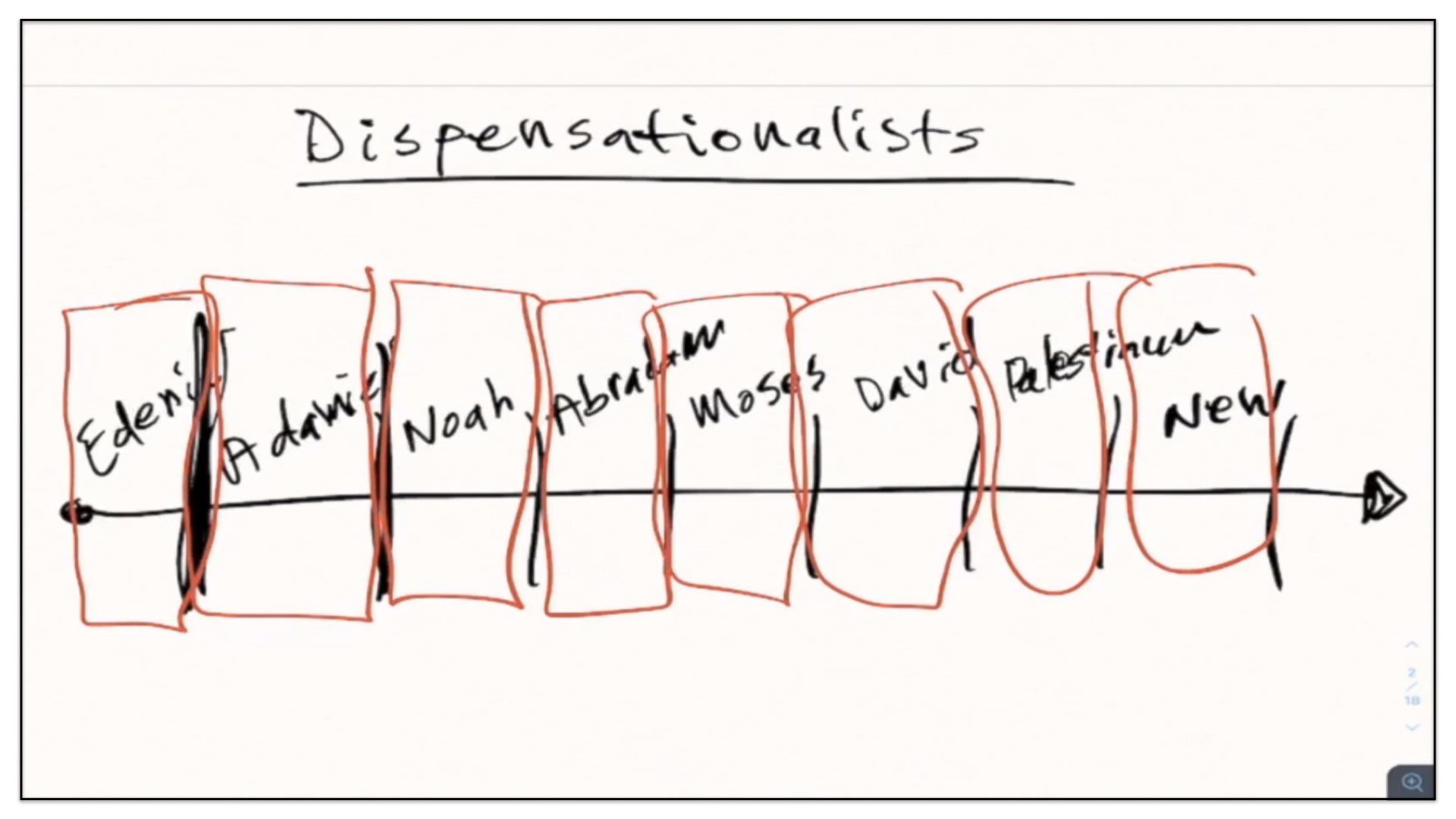
The first of these groups are what are called Dispensationalists. It’s a long word. Modern dispensationalism was formulated by a man named John Darby, in the early to mid part of the 19th century. And now, in the 21st century, it’s safe to say that this viewpoint now dominates Evangelical churches. What exactly do they believe? In a nutshell, the Dispensationalists believe that God relates to the human race—that’s a timeline by the way; forgive me, in these notes, I’ve explained in the previous studies, I’m out of time in the busy schedule I’m keeping for this month and probably the first part of next month, and therefore I haven’t had the time to present polished notes as usual; so you’re gonna have to bear with me as I make the notes as we go along; I can only hope the notes are clear to you and that I won’t cause more confusion by using the notes than if I forgo the notes; I’ll use the notes and hope they make a difference and be a help to you; so this is a timeline I’ve drawn on the screen—and as I’ve said, the Dispensationalists believe that God relates to the human race in different ways, according to specific time periods throughout the course of history. And then they believe that within each of these time periods, there are covenants that govern the people. Most, or I should say many, Dispensationalists believe there are at least eight major covenants. Allow me to highlight them for you. They believe the first of these covenants is what’s called The Edenic Covenant, or the covenant made in the Garden of Eden; and then there’s the Adamic Covenant; and then the Noahic Covenant; the covenant God made with Abraham, then with Moses, then with David. Then they have something called the Palestinian Covenant. And then finally, they believe in something called the New Covenant. Now, the Dispensationalists will view these covenants to be distinct covenants, existing within their own time periods. There’s very little continuity between one covenant and the next. Each covenant comes to an end whenever that time period finishes and the new covenant begins. I like to view the Dispensational concept, or arrangement of the covenants as airtight compartments. You’re familiar with the Titanic. I think the Titanic had 16 airtight compartments in the lower part of the deck, so that in the event the ship would strike a, let’s say an iceberg head on, if the first couple of compartments were compromised, the other compartments in the bottom part of the deck of the ship could be closed off and that would allow the ship to remain afloat until they made it safely to shore. Of course, in the case of the Titanic, the ship struck an iceberg along the side and therefore it pierced a hole along several of those compartments and it compromised the integrity of the ship, which as you know, it eventually sank. I shouldn’t have gone into all that detail, but I’ve done so just to illustrate for you that it appears to me that the Dispensationalists believe that each of these covenants exist in a time-tight compartment—an airtight compartment—they exist within their own little period of time and there’s little overlap from one to the other. Now, generally speaking, that’s how I would explain the general view of the Dispensationalists, when it comes to the subject of the covenants, their number and their arrangement.
The New Covenant Theology View On The Biblical Covenants
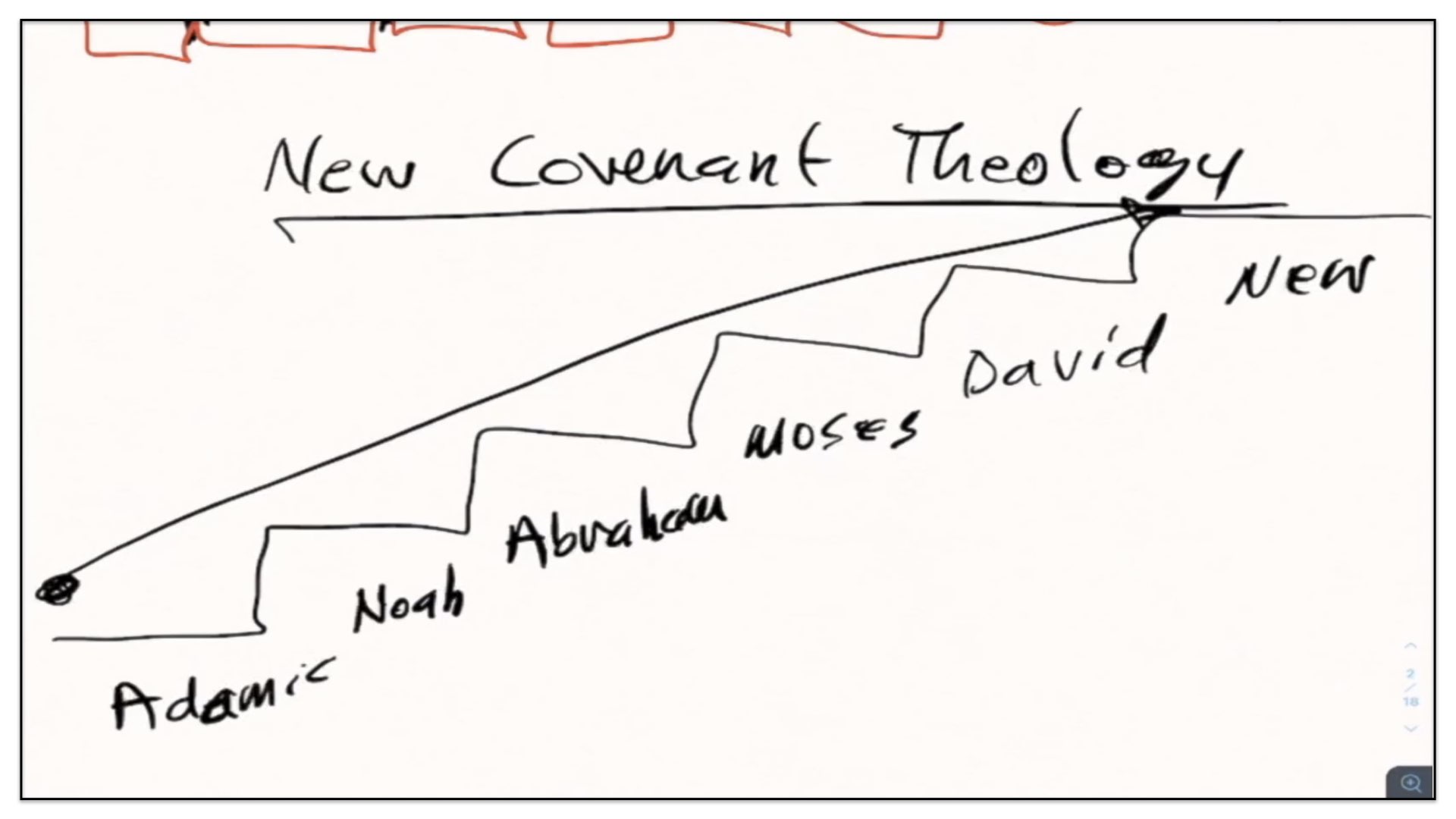
There’s a second group I’d like to highlight for you, and this is one of the newest groups around. This group usually goes by the name of New Covenant Theology. Now, New Covenant Theologists, if I understand it correctly, the leading proponents of this group of teaching, they originate from Dispensationalism. I believe that’s accurate. Most, if not all, have come from a Dispensational point of view, and they weren’t satisfied with the way Dispensationalism divides history up into these arbitrary time periods. And neither were they satisfied with how each of these covenants are lined up in these time-tight compartments, with little continuity between them. So what the New Covenant Theologists did, they reorganized their system of teachings when it comes to the covenants—they dismissed the Dispensational framework. They embraced the covenantal idea, and rather than eight, they selected six covenants they believe are found in the Bible. I’ll just highlight these for you. The first of these would be the Adamic Covenant, and then there would be the covenant God made with Noah, then with Abraham, then with Moses, then with David, and finally a New Covenant. Now, unlike the Dispensationalists, the New Covenant Theologists believe that these covenants are progressive in nature, and therefore we wouldn’t view this arrangement to be setup in time-tight compartments, but rather, you can view it more like a staircase—a staircase that leads from the bottom, or first covenant, to the last covenant, what they call a progressive revelation. There is more to New Covenant Theology than this, but as a whole, when it comes to the number and arrangement of the covenants, that is how I understand their view. So that’s Dispensationalism and New Covenant Theology.
The Presbyterian And Traditional Reformed Baptist View On The Biblical Covenants
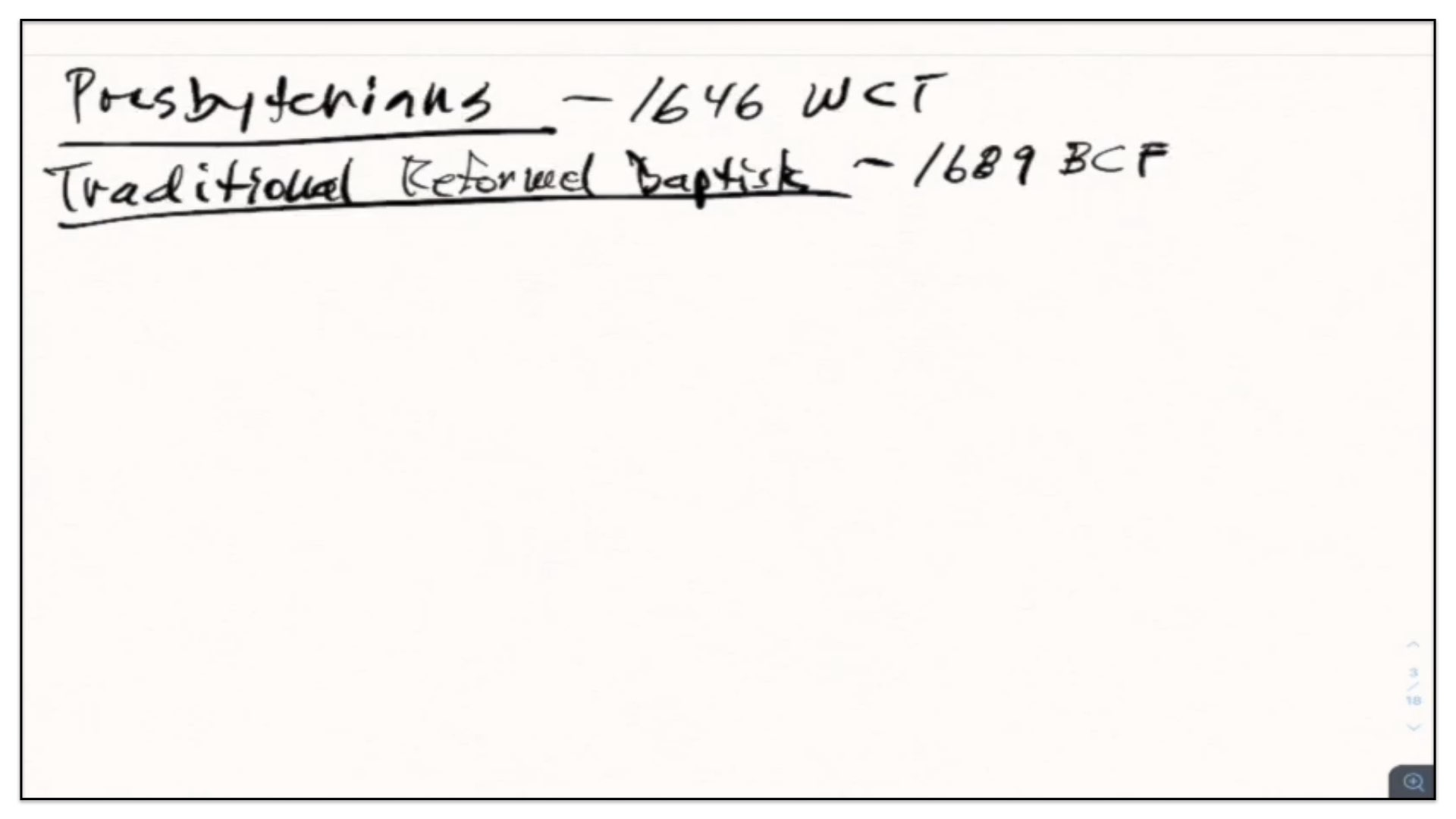
Let me mention a couple of other groups. I’m going to join these groups together. There’s the Presbyterians and their cousins, the traditional Reformed Baptists. Who are these two groups? Well, the Presbyterians, or Presbyterianism, originates in the 16th century Protestant Reformation, mainly with the teachings of John Calvin of Switzerland and John Knox of Scotland. Presbyterians are self-acclaimed Confessionalists. They hold to something called the 1646 Westminster Confession of Faith, and they believed that historic document is almost a perfect articulation of what they believe concerning the Bible and theology and the covenants. As for their cousins, the traditional Reform Baptists, I think it’s safe to say the Reformed Baptist movement began in the 1950’s, during the resurgence of Calvinism among the Baptist and Congregational churches. Some of the leading influencers at that time were men such as Iain Murray and Martyn Loyd-Jones, and influences among publications such as the Banner of Truth. Now, in my experience, Reformed Baptists tend to have more in common with Presbyterians than they do with their Baptist heritage. I therefore think it’s more accurate to refer to them as Reformed Presbyterians. And this is a case in point—traditional Reformed Baptists tend to agree with the Presbyterians on the number and arrangement of the covenants. Now, they do differ when you get into the finer print and detail of these issues, but generally speaking, I think it’s safe to clump them together. How do they view the covenants? Well, they believe that there are three major covenants. I’ll just draw, once again, a timeline. Mmm, let me back up. Oh, I should mention by the way. The traditional Reform Baptists are also self-acclaimed Confessionalists, and they hold to something called the 1689 London Baptist Confession of Faith. They love that document, just as the Presbyterians love the 1646 Confession, so these Reformed Baptists believe the 1689 is almost a perfect articulation of their faith when it comes to scripture and theology and the covenants. Well, back to their view of the covenants. I’ll just draw this timeline.
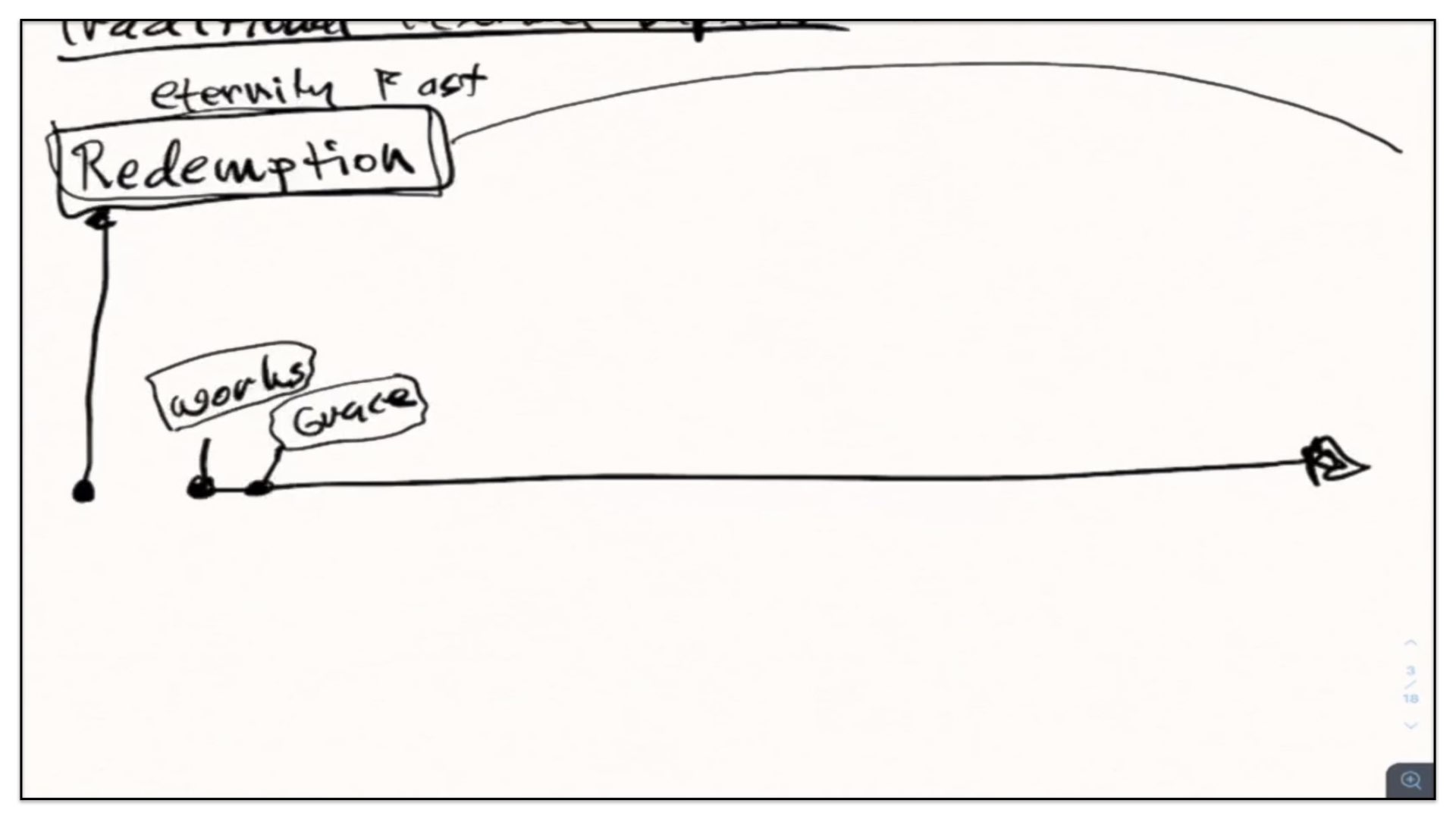
So, they believe there’s three major covenants. The first of these would be the Covenant of Redemption. Now, they view the Covenant of Redemption as existing in what they call eternity past—this is their language, not mine. And therefore, they don’t see this Covenant of Redemption to exist within a time frame. They see it as existing before the foundation of the world, from eternity past, and they see the Covenant of Redemption extending from eternity in prospect over the course of history. So really, the Covenant of Redemption is a backdrop to all of the other covenants. When you come to the other two major covenants in this framework of teaching, they believe in a Covenant of Works and they believe in a Covenant of Grace. Now, what they mean by the Covenant of Grace is very different than what I mean by that expression, or that label. When they refer to a Covenant of Grace, they’re talking about God making a covenant with sinners unto salvation. They see the Covenant of Redemption as being an eternal covenant between the Father, Son and Spirit. But they see the Covenant of Grace as being a time covenant that God makes with sinners and He requires of sinners within the Covenant of Grace saving faith in Christ in order to be saved. Therefore, the Covenant of Grace in their view would be conditional on man’s faith. So, if you look at this from a general perspective, the Covenant of Works they believe God made with Adam before he sinned, and the Covenant of Grace they believe God made with Adam after he sinned.
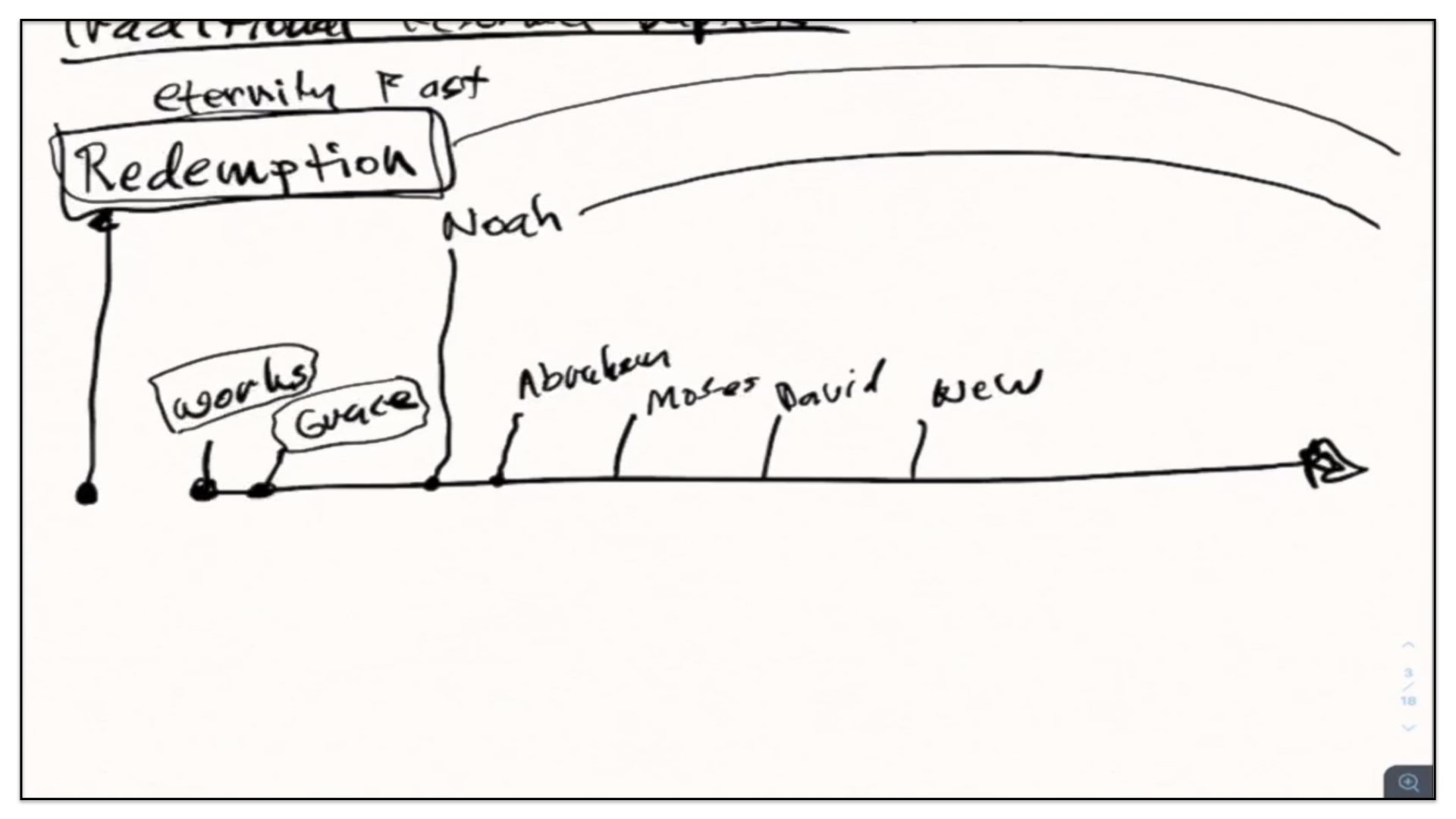
Now, these two groups also believe in a covenant called the Noahic Covenant—a covenant God made with Noah. And they view this to be a universal covenant for the world that falls under what they call the common grace of God for humanity and for all creatures. And they see this extending to the end of the world. Of course, God in this covenant promised He would not again destroy the earth with a worldwide flood. They then view another set of covenants after Noah. They believe there’s a covenant God made with Abraham, and then another covenant God made with Moses, another covenant God made with David and another covenant that’s called the New Covenant.
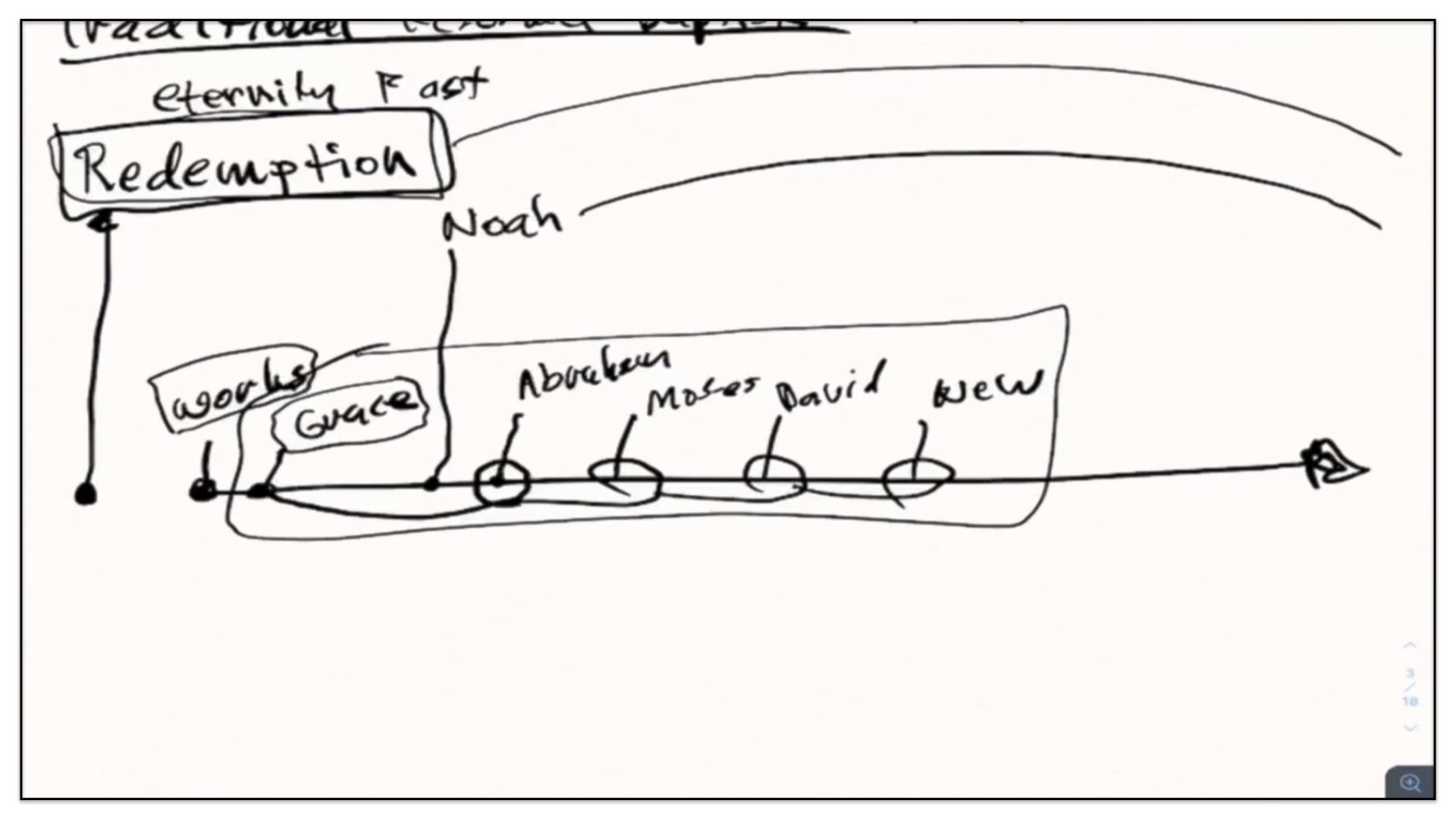
Now, what they believe about this is that the Covenant of Grace God established in the Garden of Eden with Adam, after he sinned, is administered in these other covenants, insomuch that the Abrahamic Covenant is also the Covenant of Grace under a specific administration during that time in history; and then the covenant God made with Moses and the children of Israel, they believe that is also the Covenant of Grace differently administered during that time in history; and the same with the Covenant of David and then with the New Covenant. So, in essence, they view all of these covenants to basically be the same covenant—a conditional Covenant of Grace differently administered throughout the different periods of time. I think that pretty much covers what they tend to believe about the number and the arrangement of the biblical covenants.
The 1689 Federalist View On The Biblical Covenants
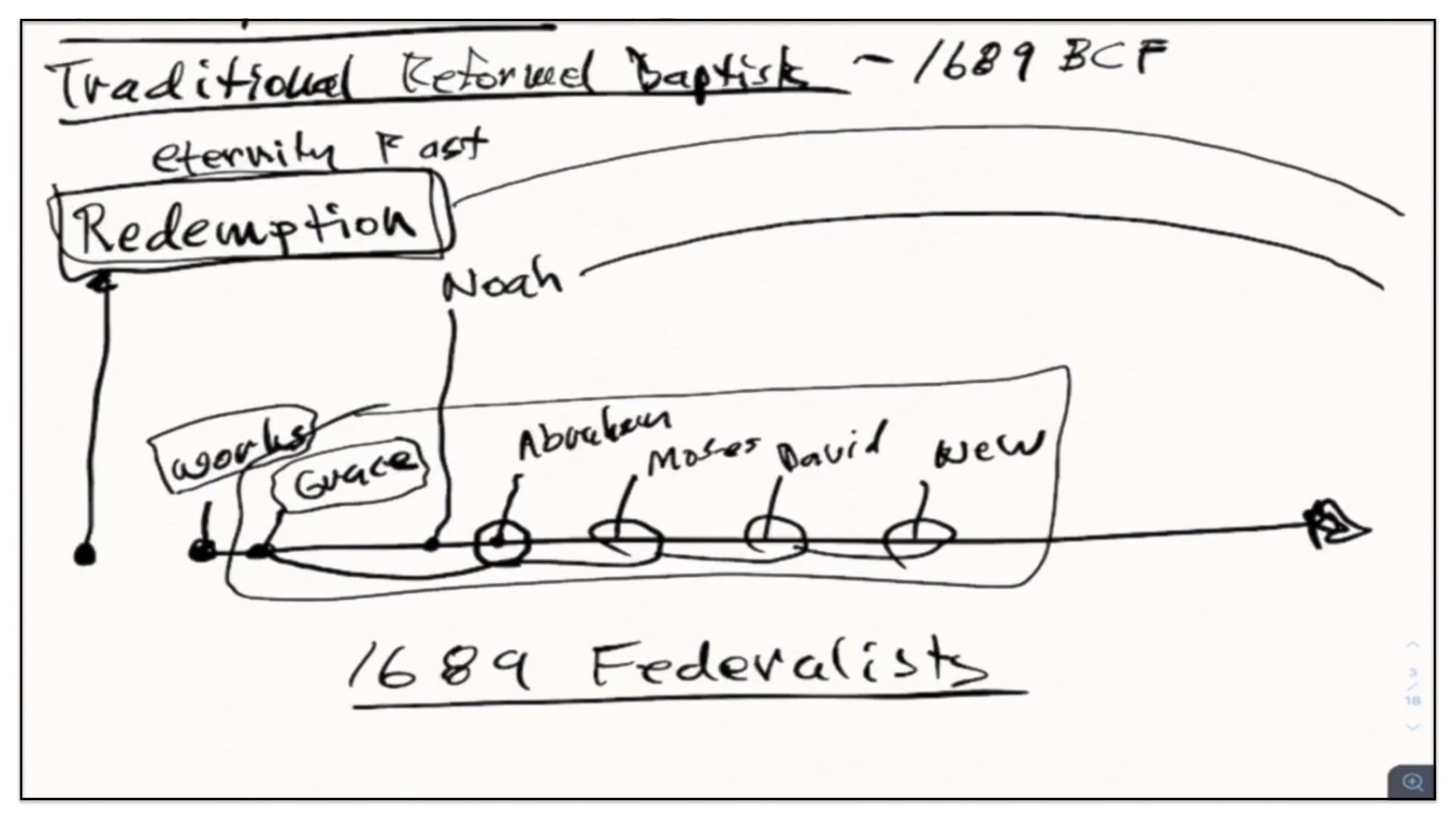
Let me now share with you just one more group. This is also a rather new group. This group is what goes by the name of the 1689 Federalists. I’m not sure exactly when this group emerged, but I suspect it’s within the last 15 or 20 years. The 1689 Federalists. First of all, don’t let the word federalists intimidate you or confuse you. Federalist is another word for covenantalist. Covenants. Federalism, covenantalism. It’s the same thing; the group could be called the 1689 Covenantalists. That’s all federalism refers to. But they’ve chosen this word it distinguishes them as a group and I have no problem with their name. What exactly, who exactly are they? Well, the 1689 Federalists are Reformed Baptists. They do belong to the same group as the traditional Reform Baptists. But the Reformed Baptists as a movement has started to splinter and divide over the last 20 to 30 years. So that now, there is no longer a single group of Reformed Baptists. There’s actually many branches of Reform Baptists, so that if you talk to one Reformed Baptist, you can’t always take for granted you know what he or she believes. There is a wide range of views among them now. The 1689 Federalists is one of these branches under the, within the, the tree of Reformed Baptist teachings. Now, what exactly do they believe about the covenants?
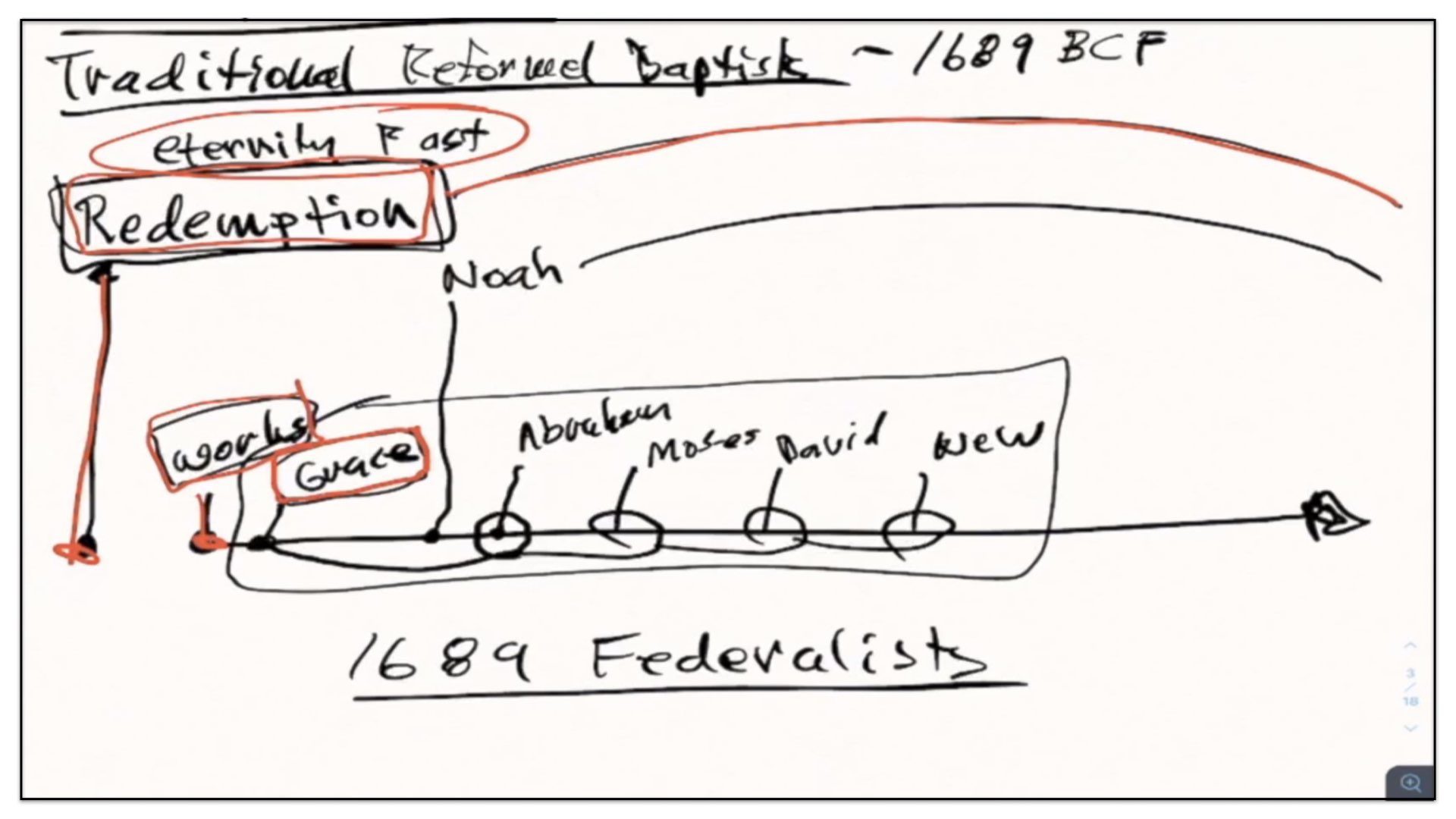
I think it’s good if I just back up and use the framework for the previous groups—Presbyterians and the traditional Reform Baptists—I’ll use this framework to explain what it is the 1689 Federalists believe. In essence—I’ll just change the color pen here. In essence, the Federalists—that’s what I’ll call them for short—the Federalists agree with quite a few things as it appears on this diagram, or chart of the traditional Reformed Baptists’ view on the covenants. For example, they also believe in a Covenant of Redemption. They believe that Covenant of Redemption exists in eternity past. They therefore view it as in the background of time and events. The Federalists also believe in a Covenant of Works that God made with Adam, before the Fall. However, and this is where things start to differ, they do not believe this conditional covenant—well, let me back up and say they agree with Presbyterians and traditional Reform Baptists that there is a conditional Covenant of Grace. They agree with that.
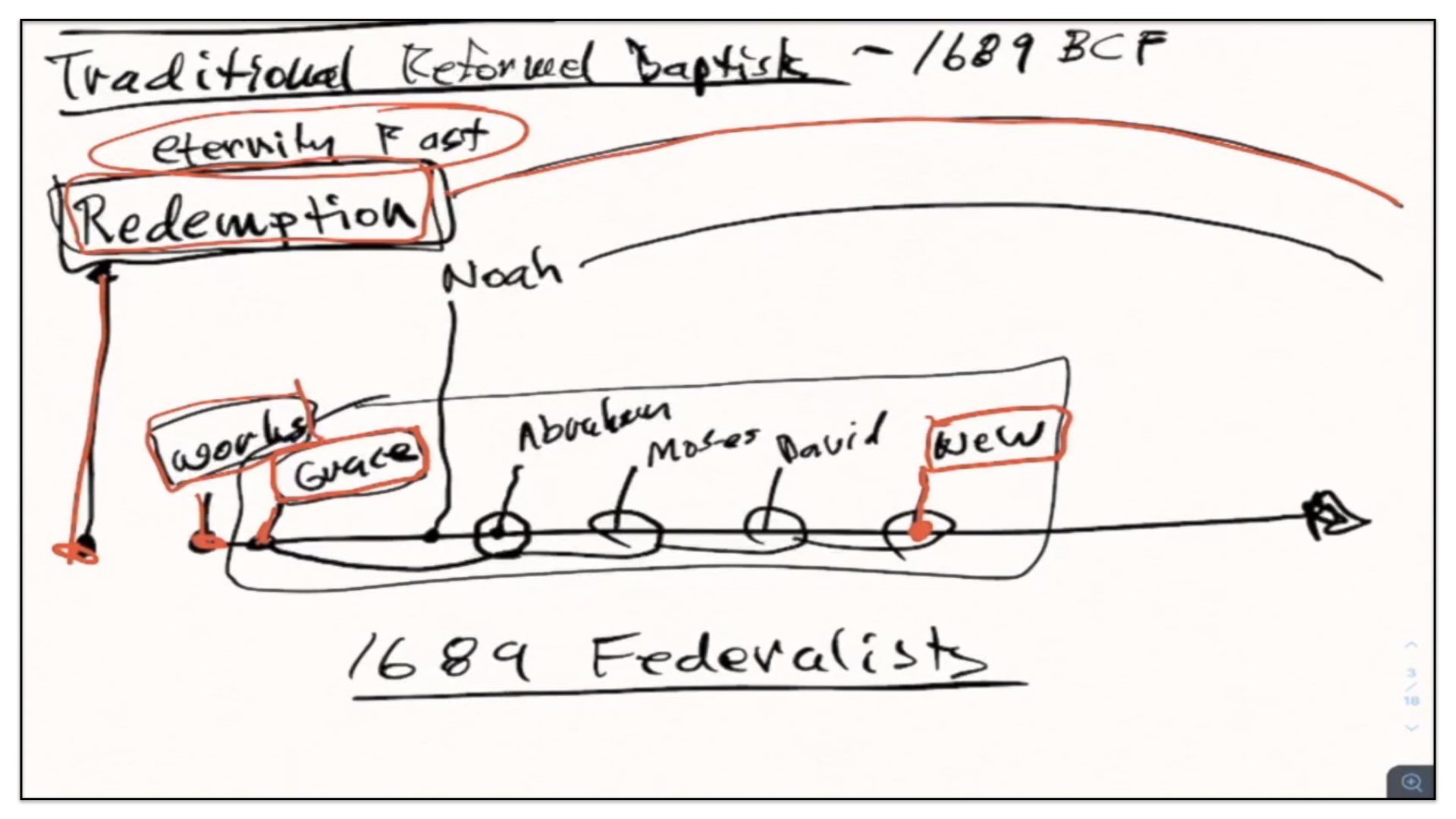
But they do not agree that the conditional Covenant of Grace began in the Garden of Eden. They don’t believe that. Rather, they believe the conditional Covenant of Grace began after Christ died at Calvary. They believe that’s the establishment, or the ratification, of the Covenant of Grace. And they therefore view, what’s called the New Covenant, to be exactly the same thing as the conditional Covenant of Grace.
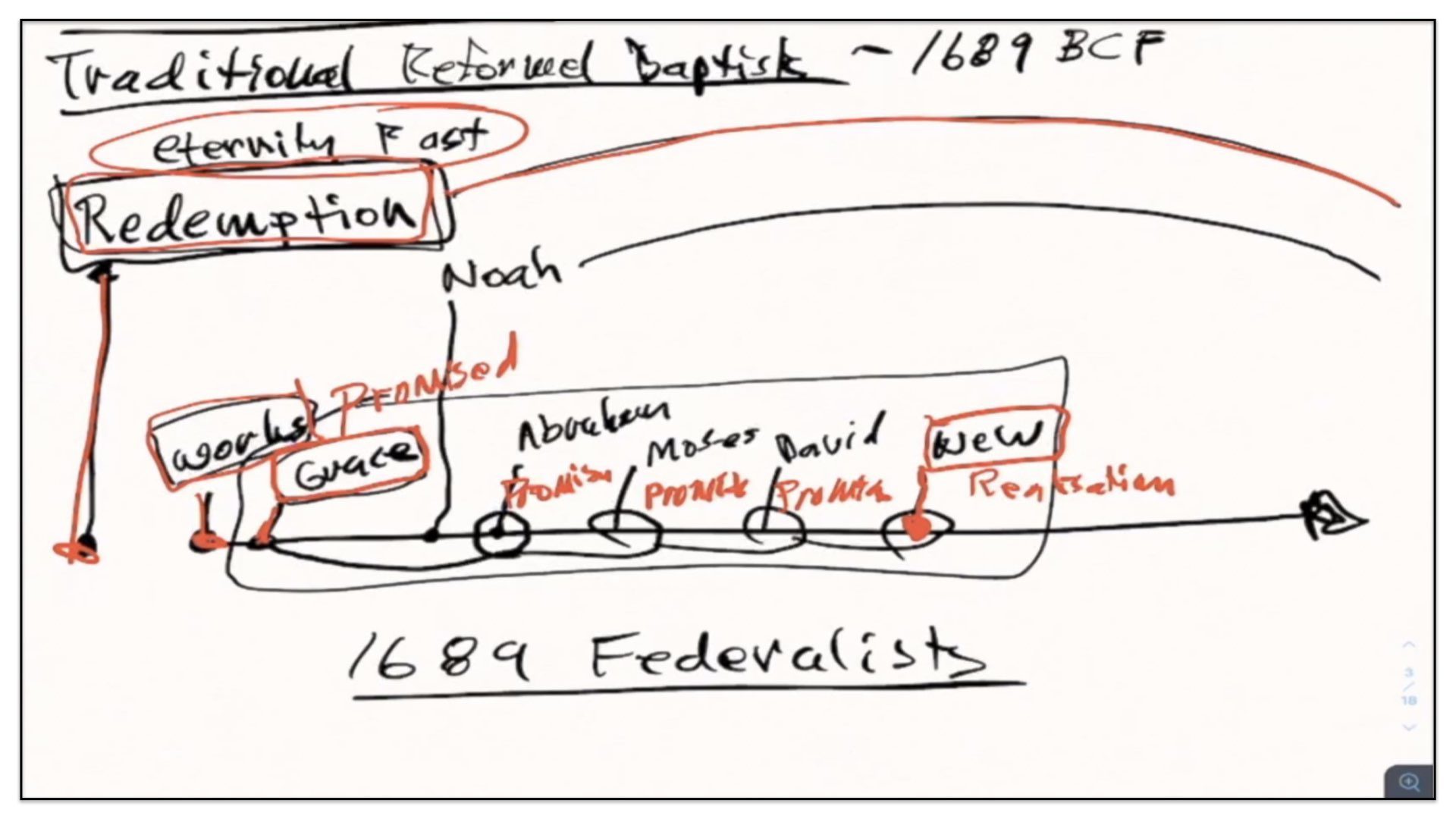
They do believe, however, that this conditional Covenant of Grace was promised by God in the garden of Eden. It wasn’t established in the garden of Eden. It was established on mount Calvary. However, it was promised in the garden of Eden. And then God continued to promise it, in all of these other covenants—the covenant with Abraham, the covenant with Moses, the covenant with David, until finally this conditional Covenant of Grace is realized with the death of Christ. That’s the realization—that’s what I tried to write down in the notes of this conditional Covenant of Grace.
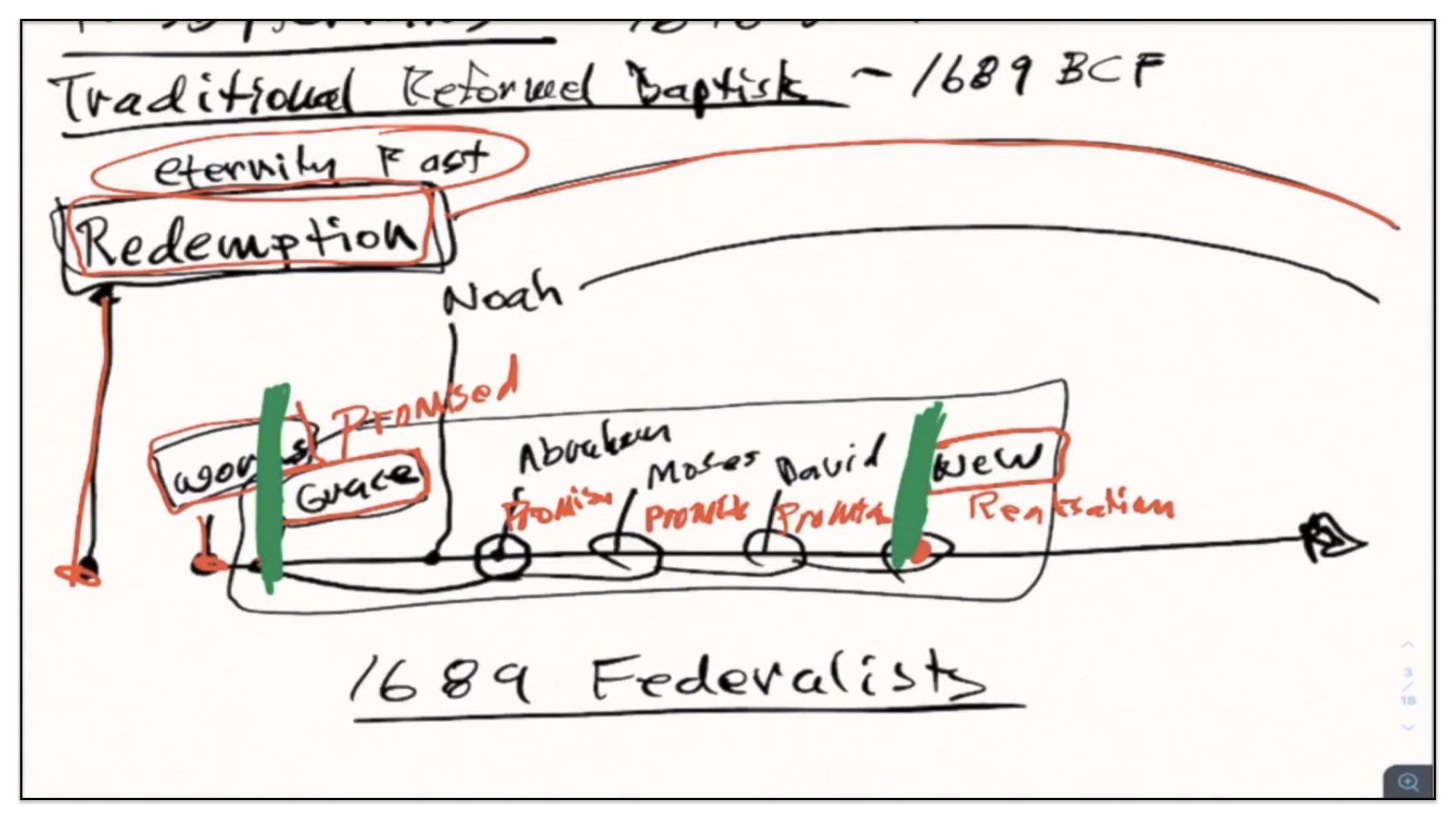
So, in a nutshell, to distinguish between the traditional Reform Baptists and the 1689 Federalists, the idea is simply this—the traditional Reform Baptists believe the conditional Covenant of Grace began in the garden of Eden, whereas the 1689 Federalists believe this conditional Covenant of Grace began on mount Calvary. And, although the views look similar, the difference between them actually have extensive ramifications and other teachings. But of course, that’s beyond the scope of this study. Well, that in a nutshell is an overview of what these popular groups believe concerning the number and the arrangement of the Bible covenants.
My Disagreement With The Foregoing Views
Now, I promised I was going to share with you my own view on the subject. But before I do, give me just a few moments to back up and I would like to explain very quickly why I do not agree with the way in which these different groups have numbered and arranged the Bible covenants.
The Reasons I Disagree With The Dispensationalists
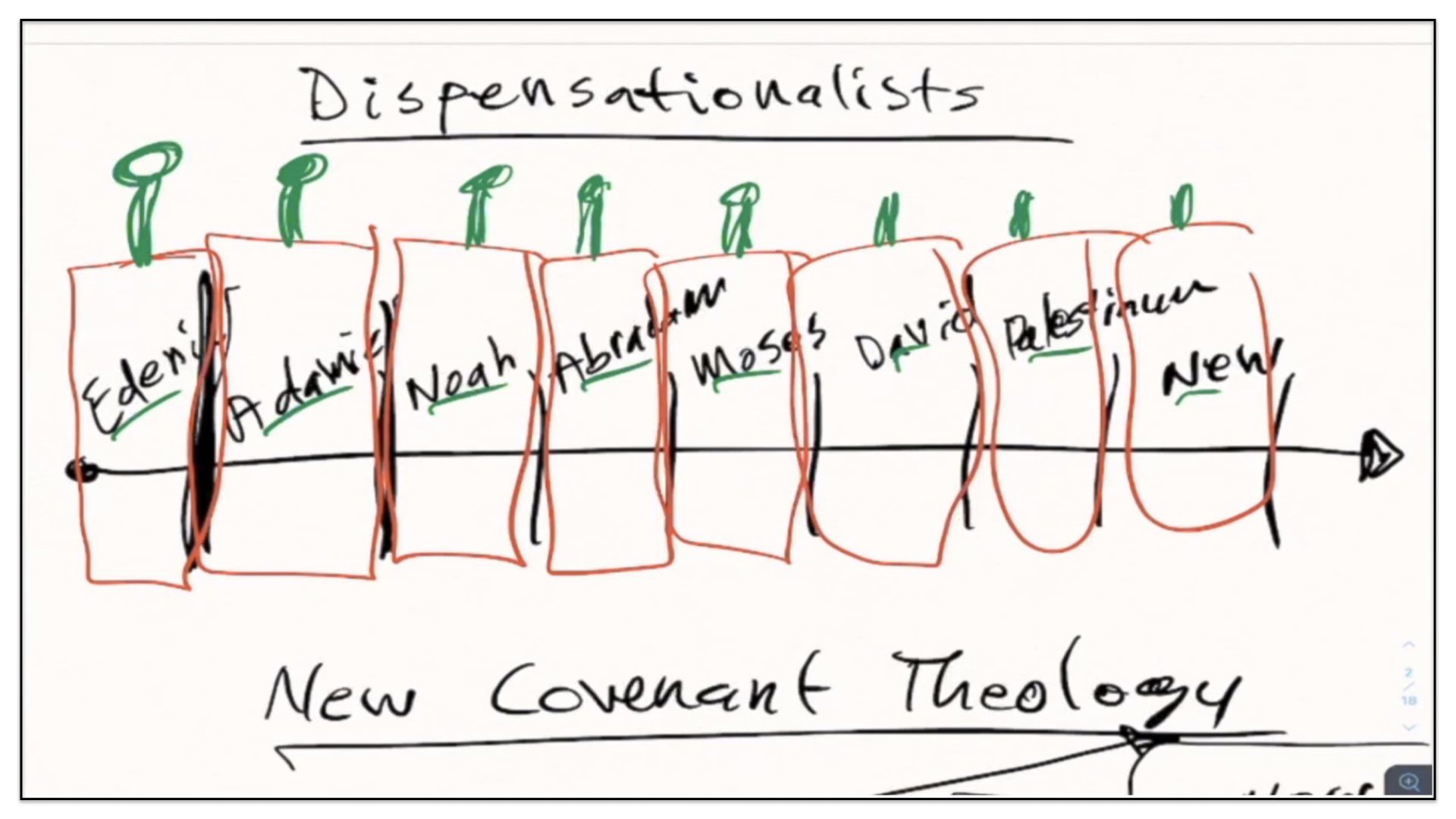
I’d like to begin with Dispensationalism. The first thing I’ll point out about Dispensationalism. Let me change, I’ve got a different color pen, we’ll use the color green to point out my disagreements. First of all, I’d like you to notice the Dispensationalists believe that man is responsible to God under the authority of dispensations, periods of time, and that God imposes certain duties and responsibilities on man within those dispensations. They do not believe that man is held accountable to God under the basic parameters of a covenant, although they do incorporate the idea of a covenant within their framework. Now listen, on that basis alone, I believe this entire framework is erroneous. As I mentioned at the beginning, every relationship is based upon the authority of a covenant. Not a dispensation.
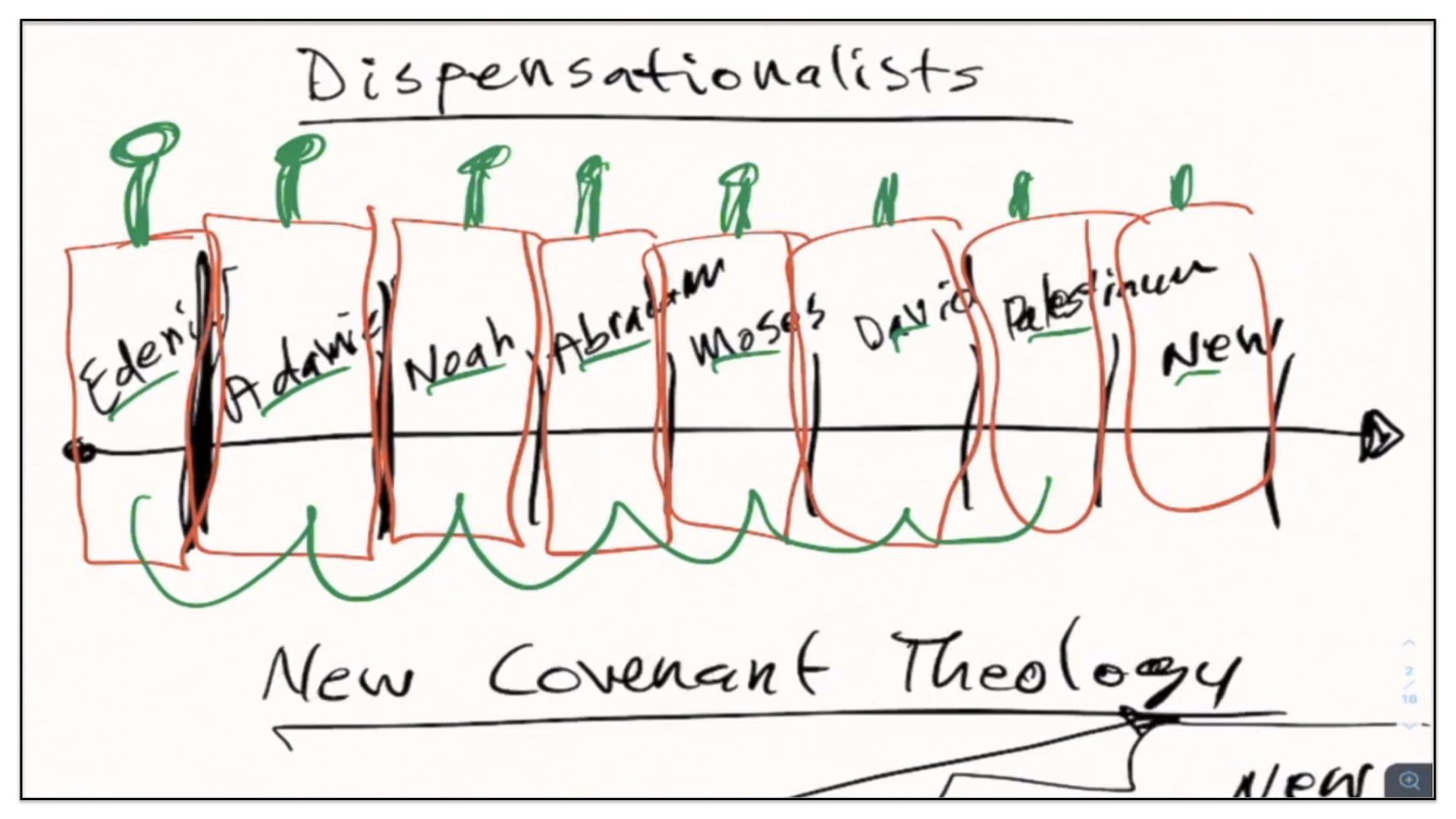
But that to the side, let me mention another reason I reject the dispensational overview of the covenants. You’ll notice, there’s not much continuity between these major covenants of the Bible. At least for the New Covenant Theologians, they’re attempting to show some type of progression between one covenant and the other. That type of progression simply doesn’t occur, at least very evidently, within a dispensational framework.
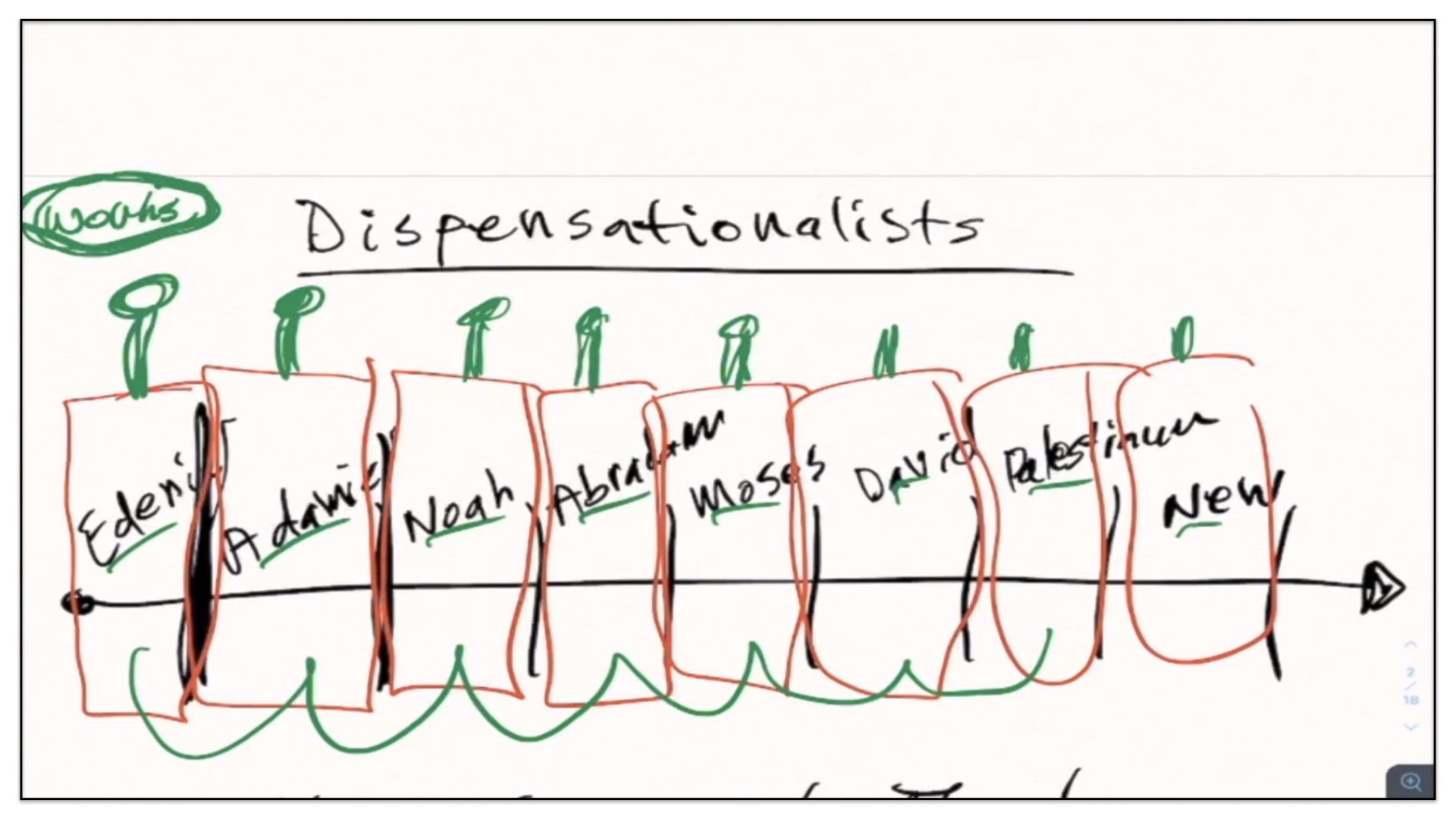
Another reason I reject dispensational view of the covenants. You’ll notice they do not believe in what I would call a Covenant of Works—a perpetual Covenant of Works, under which God holds the entire human race accountable for their sins. Now, this is incorporated in some way or another within their framework, but it’s not found within the simplicity of what’s identified as this Covenant of works.
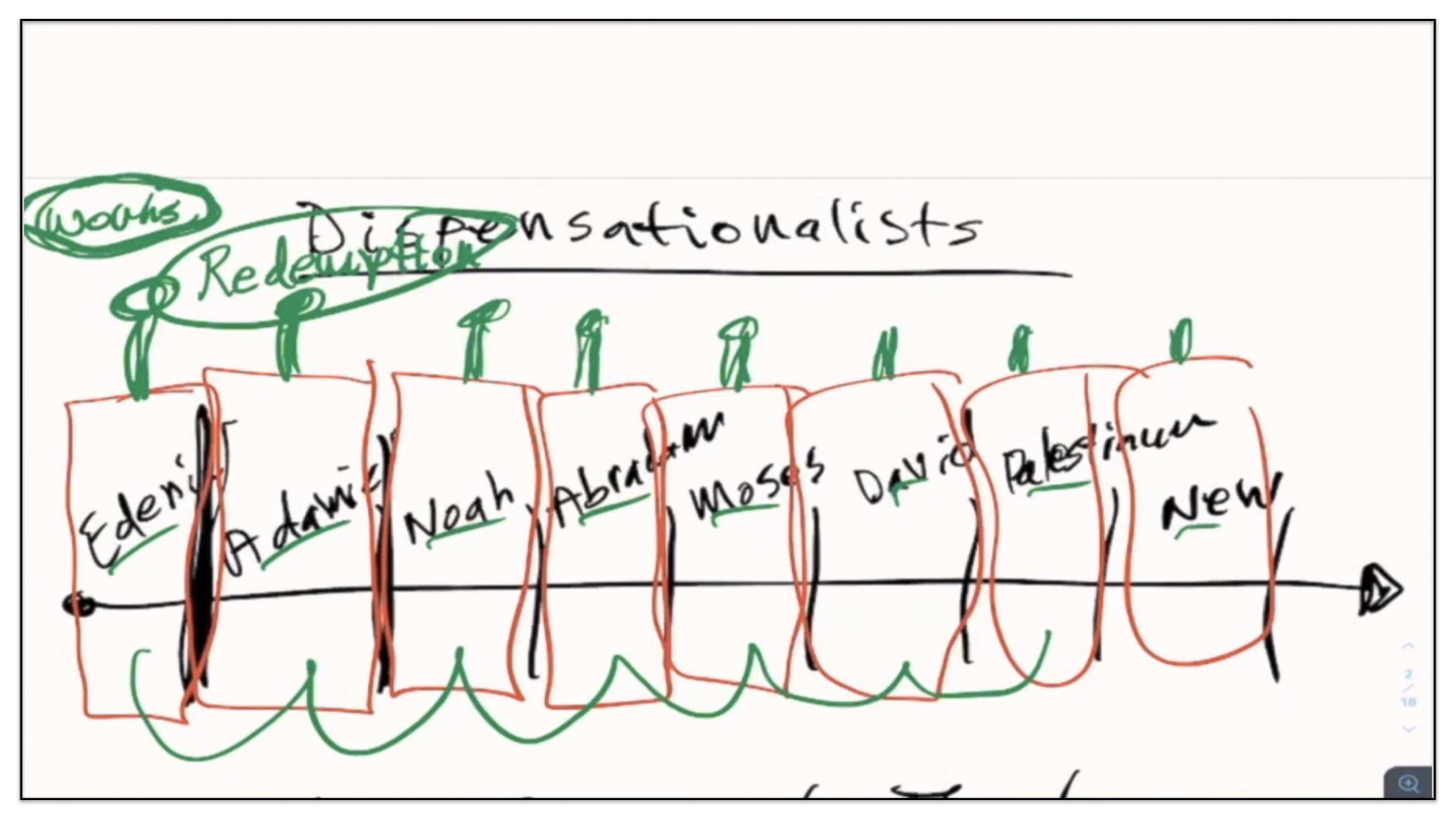
Again, neither do the dispensationalists believe in a Covenant of Redemption. Now, of course, the Covenant of Redemption is the agreement between the Father, Son and Spirit for the salvation of Their people—the Father electing by His love, the Son redeeming by His grace and the Spirit of God sanctifying by His power. But you see, the dispensationalists don’t mention a Covenant of Redemption and they actually don’t believe in that concept.
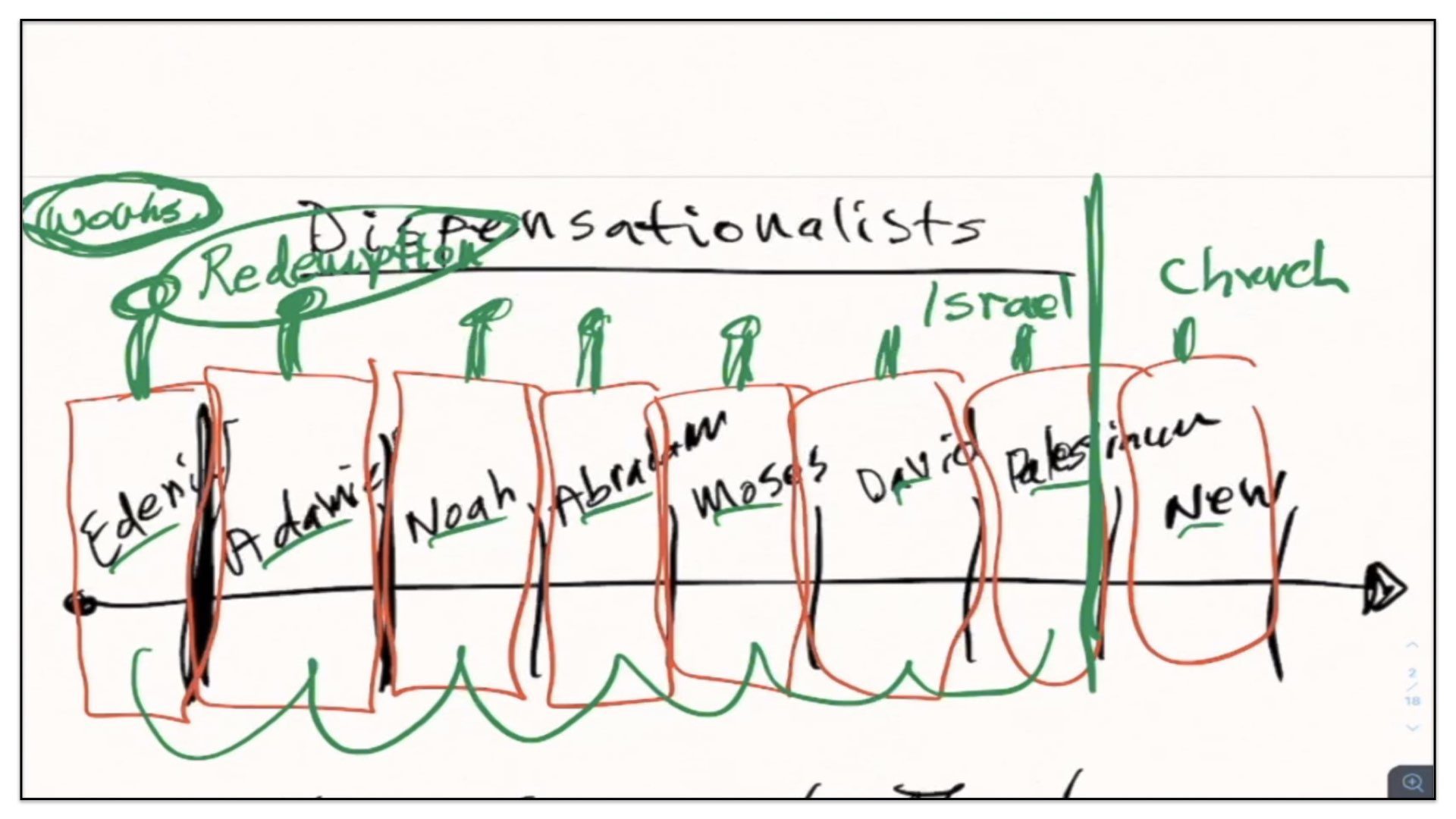
The final thing I’ll mention on the reason why I reject the dispensational viewpoint is because in this framework, they draw a line between two peoples of God—on the one hand, Israel, and on the other hand, the church. And they believe there’s two different redemptive purposes for these groups. I certainly don’t believe that and therefore I cannot possibly accept the dispensational framework on either the number or the arrangement of their covenants.
The Reasons I Disagree With New Covenant Theology
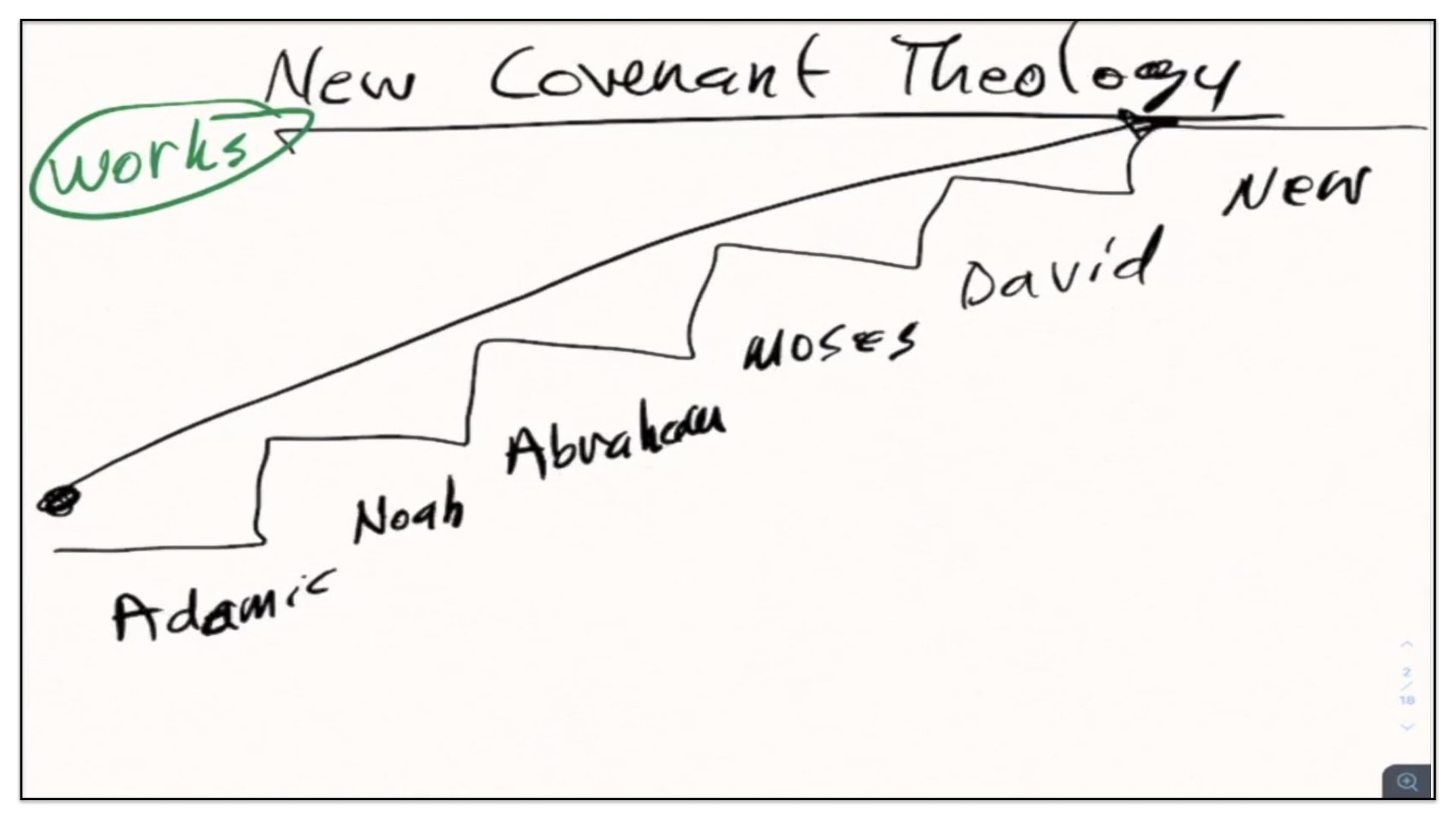
Now, what about the arrangement of New Covenant Theology? Well, some of these New Covenant Theologists also reject the idea of a Covenant of Works. Some of them. I think more recently, there are others who have been incorporating that concept into their scheme of teachings, but others have not accepted the Covenant of Works to be this perpetual covenant.
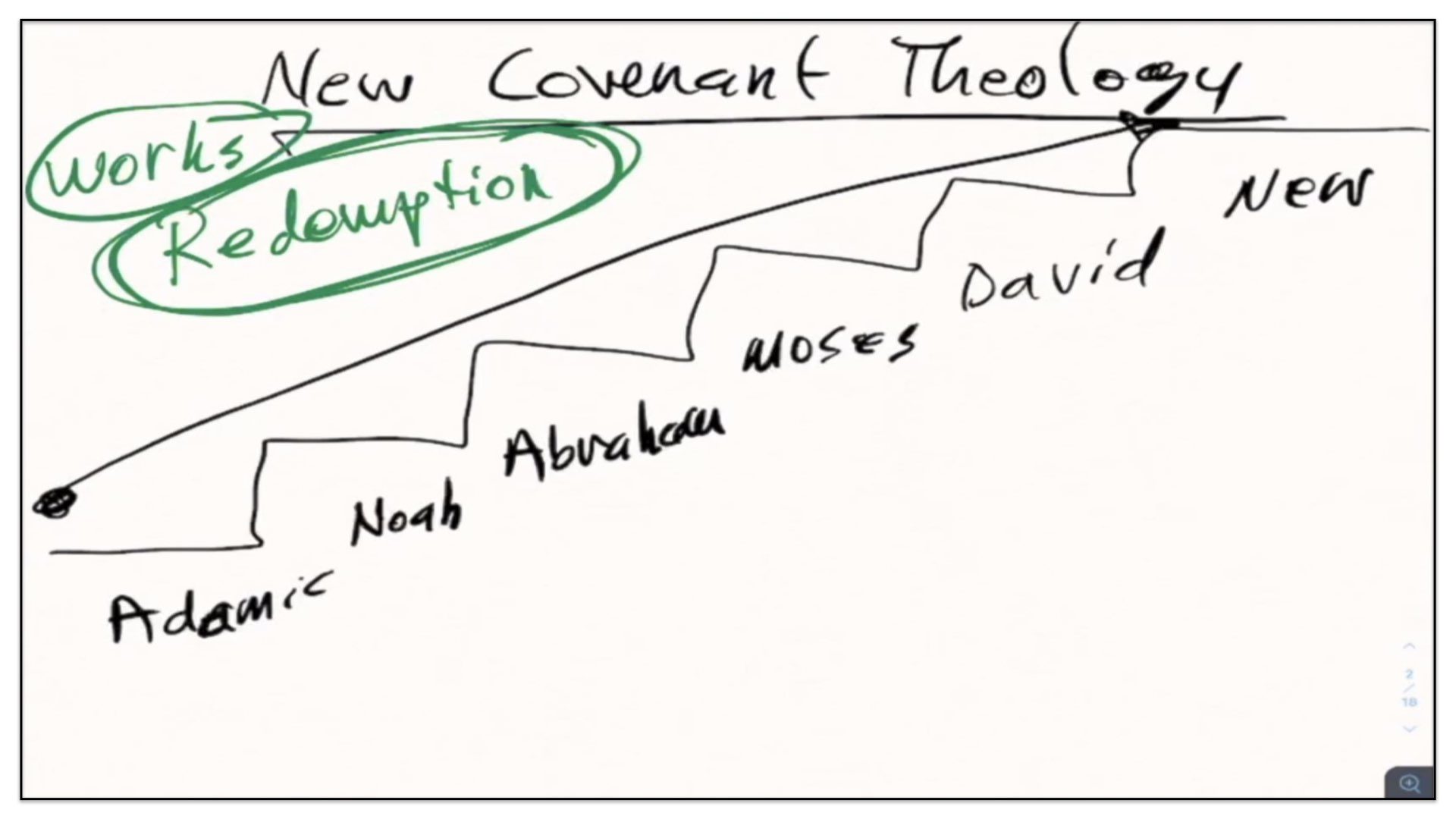
I can also say another reason why I would reject the New Covenant Theology’s viewpoint on the covenants—none of them, to my knowledge, believe in an eternal Covenant of Redemption. Now, that’s not to say that they don’t believe in a covenant the Father, Son and Spirit have made together from eternity. I mean, if any of them are Calvinists, I would assume they have to believe that on some level. But you see, within their framework of the covenants, they certainly don’t mention a Covenant of Redemption. Where does a Covenant of Redemption fit within their framework of teachings?
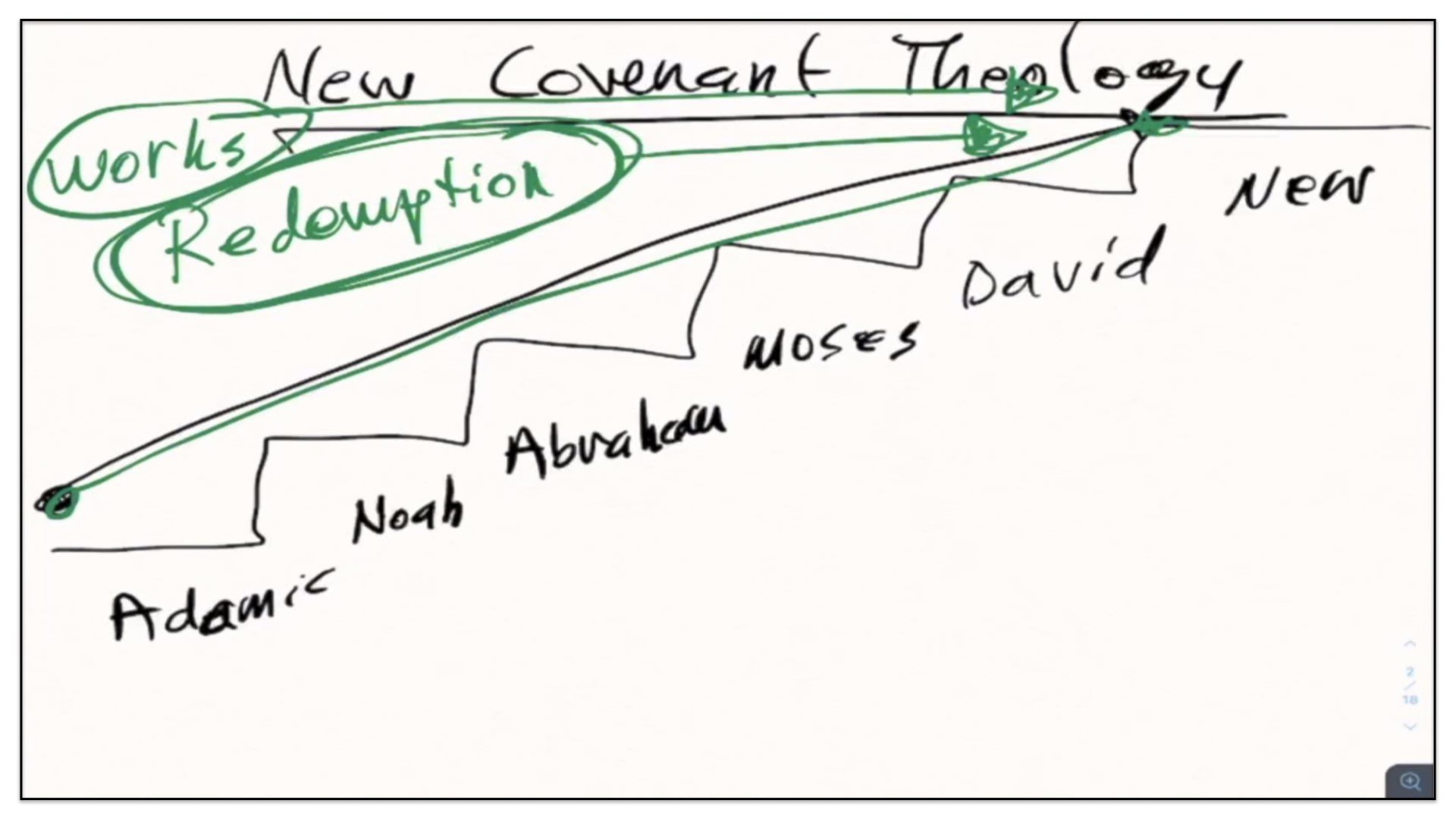
And then, finally, another reason I would reject the New Covenant Theologists’ viewpoint—all of them emphasize the progressive revelation of the covenants within the biblical revelation. Well, that’s fine. I have no problem with that. I believe in a progressive revelation of redemption through scripture. However, to my knowledge, they do not show these two perpetual covenants existing simultaneously with the progression of an unfolding drama of redemption. And for these reasons I cannot accept the New Covenant Theologists’ viewpoints on the number and ordering of the covenants.
The Reasons I Disagree With The Presbyterians And The Traditional Reformed Baptists
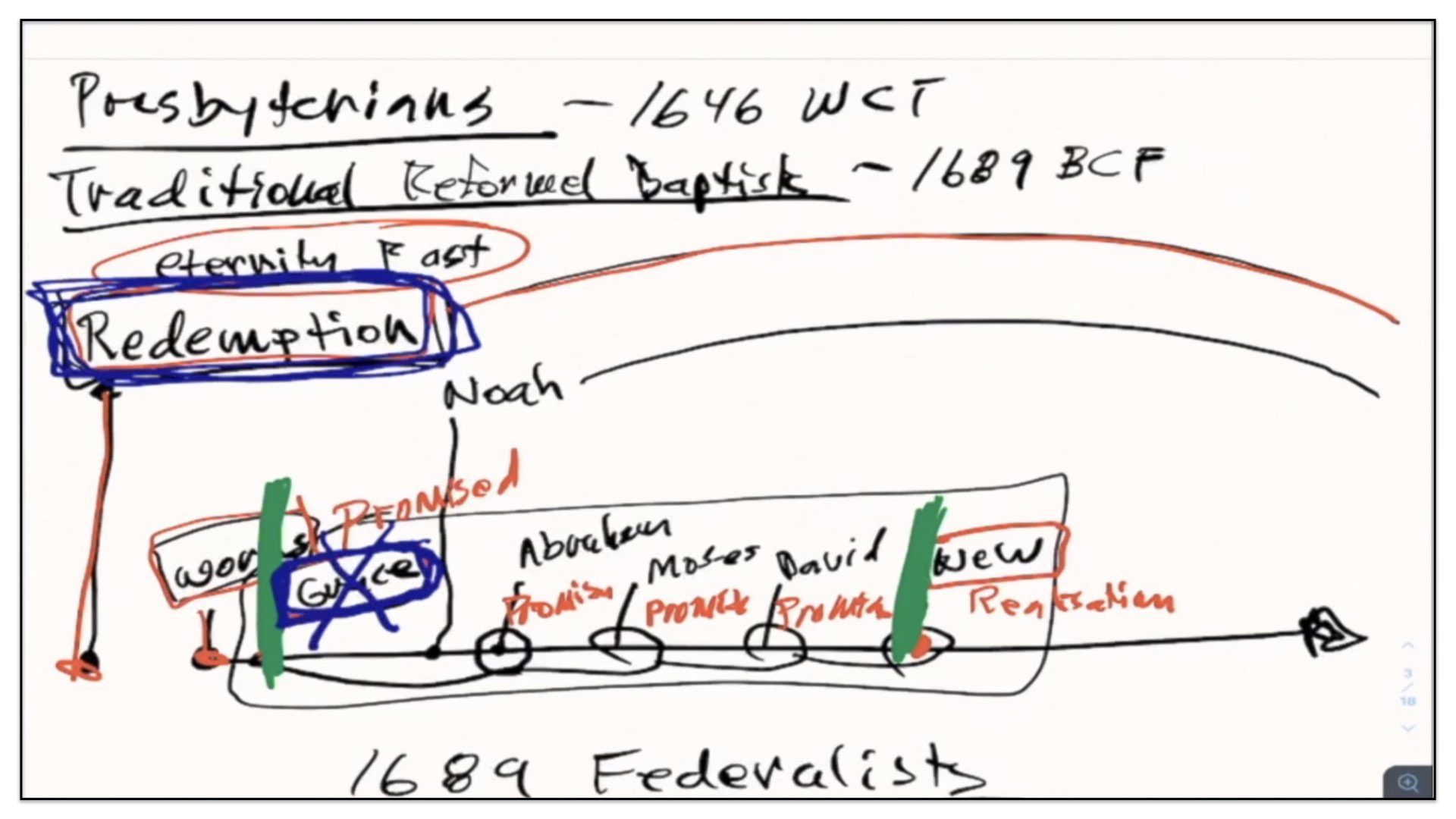
Now, what about the arrangement of the Presbyterians and the traditional Reform Baptists? First, notice, they introduce a covenant—let me just change the color of the pen; let’s choose blue—notice first, they introduce a covenant they called Grace. And as I’ve explained earlier, they believe this is an entirely separate covenant from the Covenant of Redemption. The Covenant of Redemption’s between the Father, Son and Spirit on behalf of elect sinners, whereas the Covenant of Grace is between God and the elect sinners in time, where the elect sinner is responsible under this conditional Covenant of Grace to savingly believe on Christ to seal the deal, if you like, of his or her salvation. Now, of course, Presbyterians and the traditional Reformed Baptists will say, “That’s oversimplifying it, for we know that man cannot believe on Christ unless the Spirit of God regenerates the soul, or at least until the Spirit of God works a grace within the heart to make it receptive to the gospel.” They’ll say, that and if that’s true, then what’s the purpose of their conditional Covenant of Grace? I can’t accept this idea of a conditional Covenant of Grace. I do not see any foundation in the Old or New Testaments for such a covenant. What I do find, however, is a Covenant of Redemption where the Father, Son and Spirit are accomplishing the complete work of a sinner’s salvation. And that is realized in time when the Father sends forth His Son in the fullness of time. And then when the Father and Son have sent forth the Spirit, from Adam and Eve until the last soul that is saved on earth, to work that grace of regeneration in the heart.
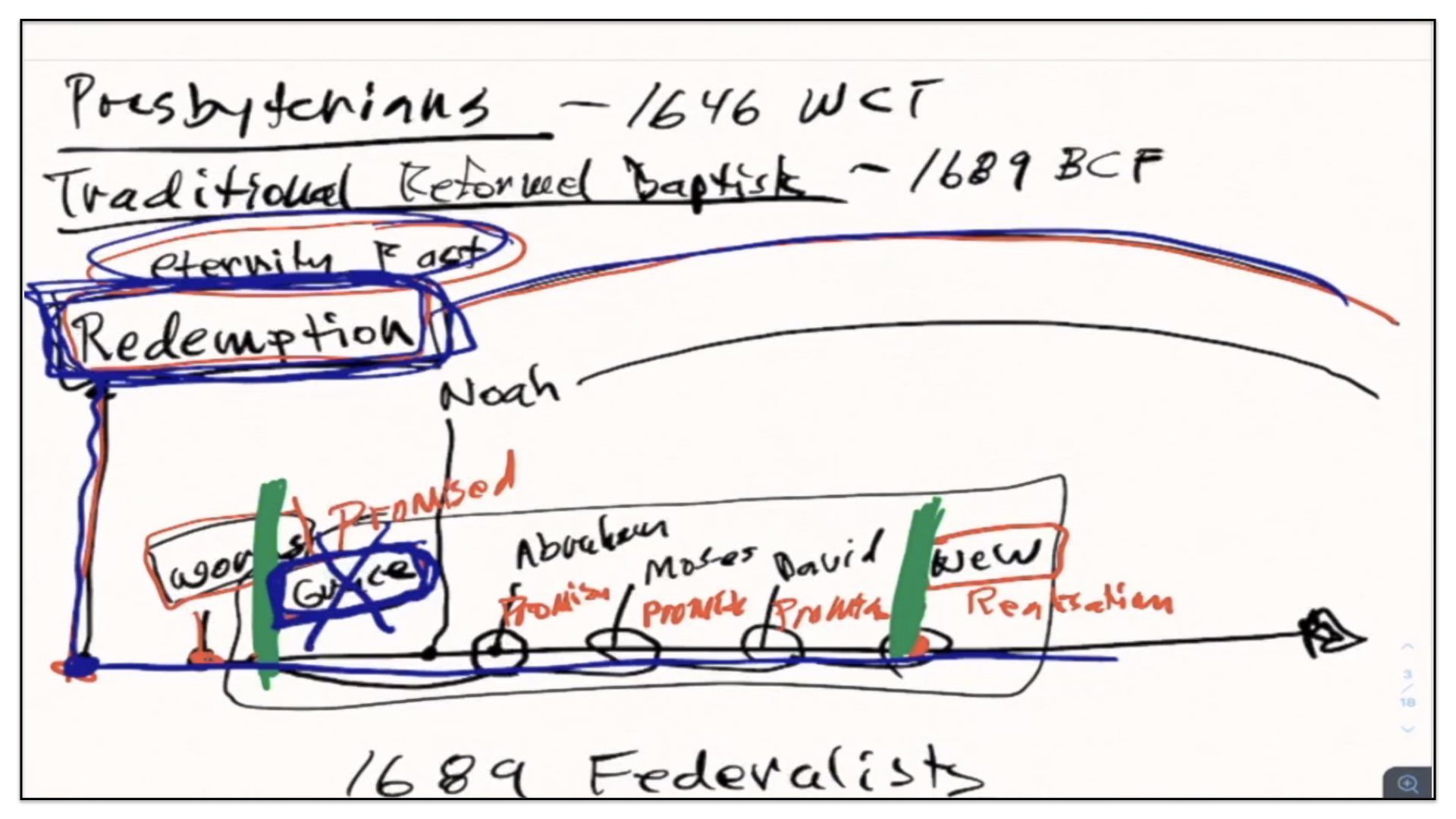
So, you see, the Covenant of Redemption is not confined to an eternity past and belongs to the backdrop, but rather, it is a covenant that penetrates time—it enters into time, and it is expressed in all of the work of grace God accomplishes in the hearts of His people.
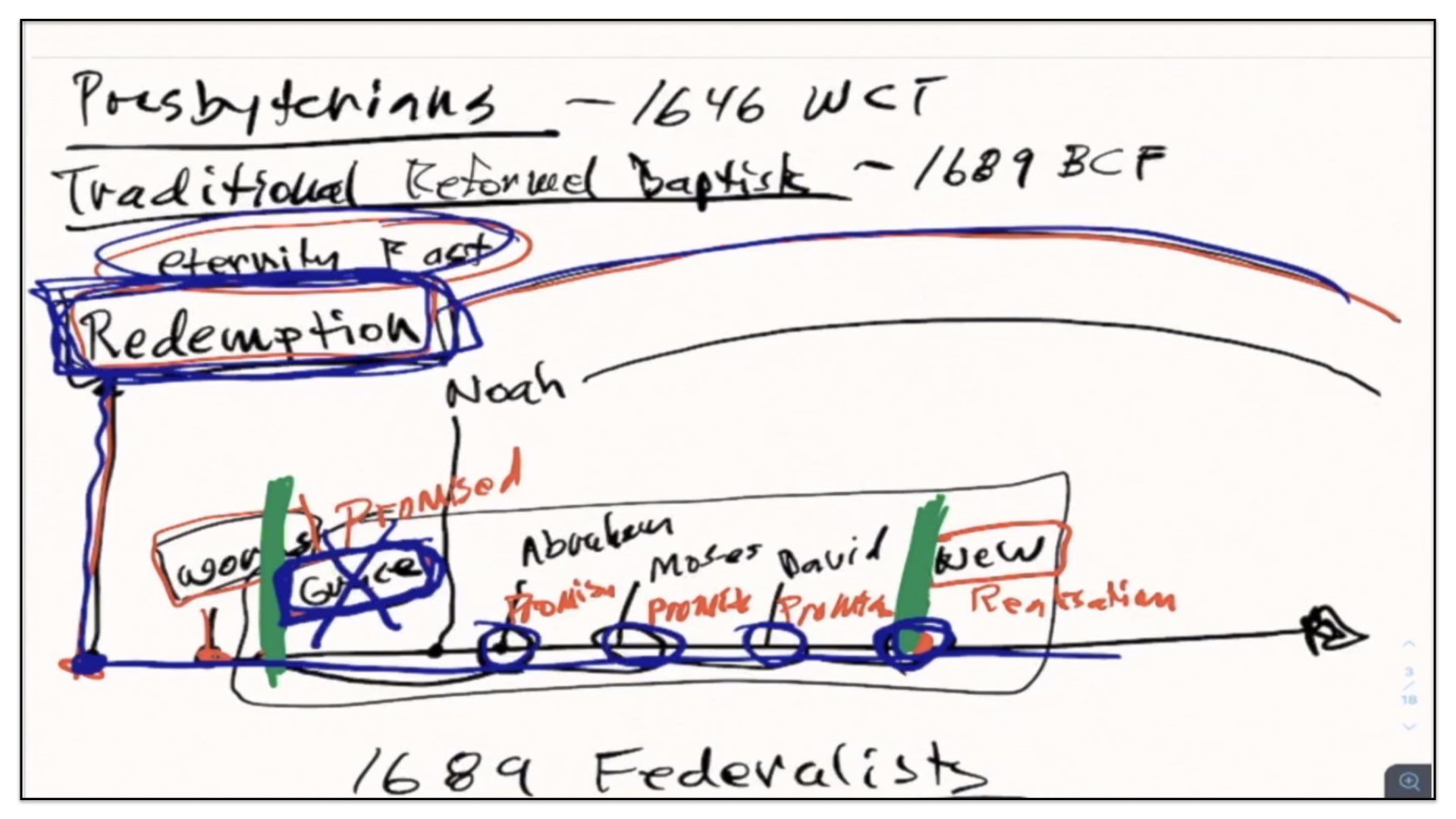
There is then another reason I would reject this general viewpoint of the covenants. Of course, the traditional Reform Baptists and Presbyterians believe that the covenant with Abraham, the covenant with Moses, the covenant with David, this New Covenant—that it’s all this conditional Covenant of Grace. Well, if a conditional Covenant of Grace doesn’t exist, then their whole understanding of what the Abrahamic and Mosaic and Davidic and New Covenant are is wrong. What is this covenant God made with Abraham, Moses, David and this New Covenant, if it’s not a conditional Covenant of Grace? You see, that’s why I reject the viewpoint of these two groups.
The Reasons I Disagree With The 1689 Federalists
Well, what about the arrangement of the 1689 Federalists? I’ve followed a lot of their teachings recently. I want to say on the one hand, I appreciate them very much. I am glad that finally, within their own circle—the Reformed Baptist circle—there are those among themselves that are beginning to challenge the others in their own group. I’m tired of doing it from outside their group. I’ve done it for years, because I disagree, as I’ve pointed some of those disagreements out with you here. I’ve disagreed with them, I’ve challenged them, but I’ve never been a Reformed Baptist. I appreciate that the 1689 Federalists are challenging people within their own group. It’s a healthy thing. I also appreciate that the very sincere—at least that’s how I’ve interpreted their explanations of what they believe and how they approach their understanding of the teachings—I very much appreciate that. However, they seem to be settled and satisfied that they have discovered the old Particular Baptist view, how the writers of the 1689 Confession really understood the covenants. And, having found what they believed to be that view, they think they have stumbled or rediscovered the true understanding, or true teachings, on the covenants. And on that point, I think they need to be a little cautious. Just because our forefathers among the Baptist Churches embraced a certain view, doesn’t make the view any more right for its historicity—for its historic legacy—than if the Baptists today were to study the scriptures and sharpen his or her view on an understanding of the covenants. I mean, our Baptist forefathers accomplished some great things, but they weren’t infallible and they certainly didn’t have a monopoly on an understanding of the covenants, or of theology. In many ways, I would suggest the Baptists of the 18th century (the 1700’s)—those Baptists tended to be sharper and more consistent. You could say more reformed in their views of the covenants. So, as advice to you, if you’re interested to study this out historically, I would point you not to the 1600’s, but to the 1700’s, and consider what those Baptist forefathers taught on the subject. Well, look, having said that, let me just point out why I disagree with the 1689 Federalists.
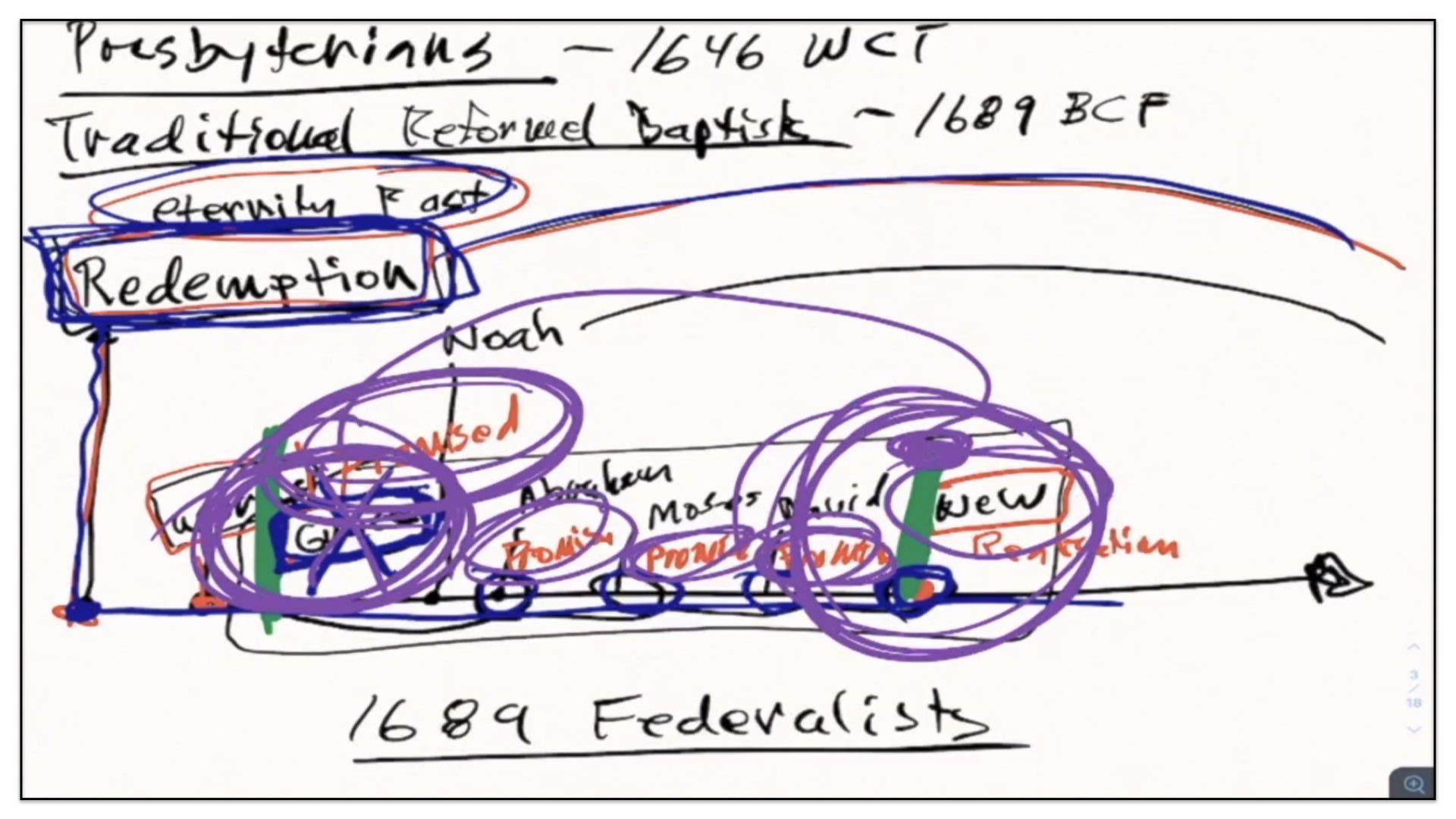
I’ll change the color pen to purple. Look, they make the same mistake as the other groups. They believe in a conditional Covenant of Grace. Now, of course, their big point—and they’re very chuffed by this—they believe that that conditional Covenant of Grace was established at mount Calvary instead of the garden of Eden. And to be honest, if I was to take one of the other of these views, I think I’d probably lean towards the 1689 Federalists. They make a valid argument. But I don’t believe there is a conditional Covenant of Grace, and therefore it doesn’t matter if it began in the garden of Eden or at mount Calvary. It simply doesn’t exist. And therefore, what the 1689 Federalists believe about a promised conditional Covenant of Grace in all of these succeeding covenants leading up to the New Covenant, their understanding is incorrect. If there is no conditional Covenant of Grace, then it is not promised in the covenants God made with Abraham, Moses or David and neither is the New Covenant that conditional Covenant of Grace. Those are some of the reasons I would dismiss the 1689 Federalists’ views on the number and ordering of the covenants.
My View On The Number And Arrangements Of The Biblical Covenants
Well, this brings me then to share with you my view on the subject. Let me change the color pen and I’ll just put this at the top of our notes—My View.
The Importance Of Examining Truth Claims In Light Of One’s Understanding Of The Bible
It is my view. And I don’t echo or copy the views of—well, sometimes I do, especially in my earlier ministry, but really, as I’ve grown in a knowledge of Christ and of grace—I just can’t echo and parrot the views of others, just because they’ve said it. I really like to examine the things, and if it doesn’t make sense in my own mind, and if I can’t reconcile it for myself with the scriptures, then I can’t be a persuaded of it. And it’s not sufficient for somebody to say, “Yeah, but that’s in the historic confession and they’ve always believed it and that’s the orthodox view.” Listen, my dear friends, orthodoxy can be wrong. Orthodoxy is not always right. Just look at a democracy and western nations today. Do the majority of the people always get it right for who they vote? No, a lot of times they get it wrong. So majority vote, or orthodoxy, is not a standard of measuring truth. And therefore, I respect the ancient documents and the old confessions and people’s writings of the past, but at the end of the day, we’ve got to take those things and filter them through our own thoughts, our own hearts, our own understanding of scripture, and be sure that what we are embracing, we ourselves are persuaded of it in our own convictions.
Okay. Now with that said, let me present to you my view. I’m going to outline it first, and then I’ll try to diagram it. Okay now, let me see the time. Yeah, look, I’ve gone far too long on the first part of this study. I’m going to ask for your patience. I don’t want to pause it here and do this teaching next week. I want to get it all out in the study. So take a deep breath. Get some oxygen flowing through your blood. Wake up a little bit and see if I can capture your attention on perhaps a different way of viewing the covenants than you’ve considered before.
An Outline Of The Biblical Covenants—Two Spiritual And Perpetual Covenants; Four Earthly And Temporary Covenants
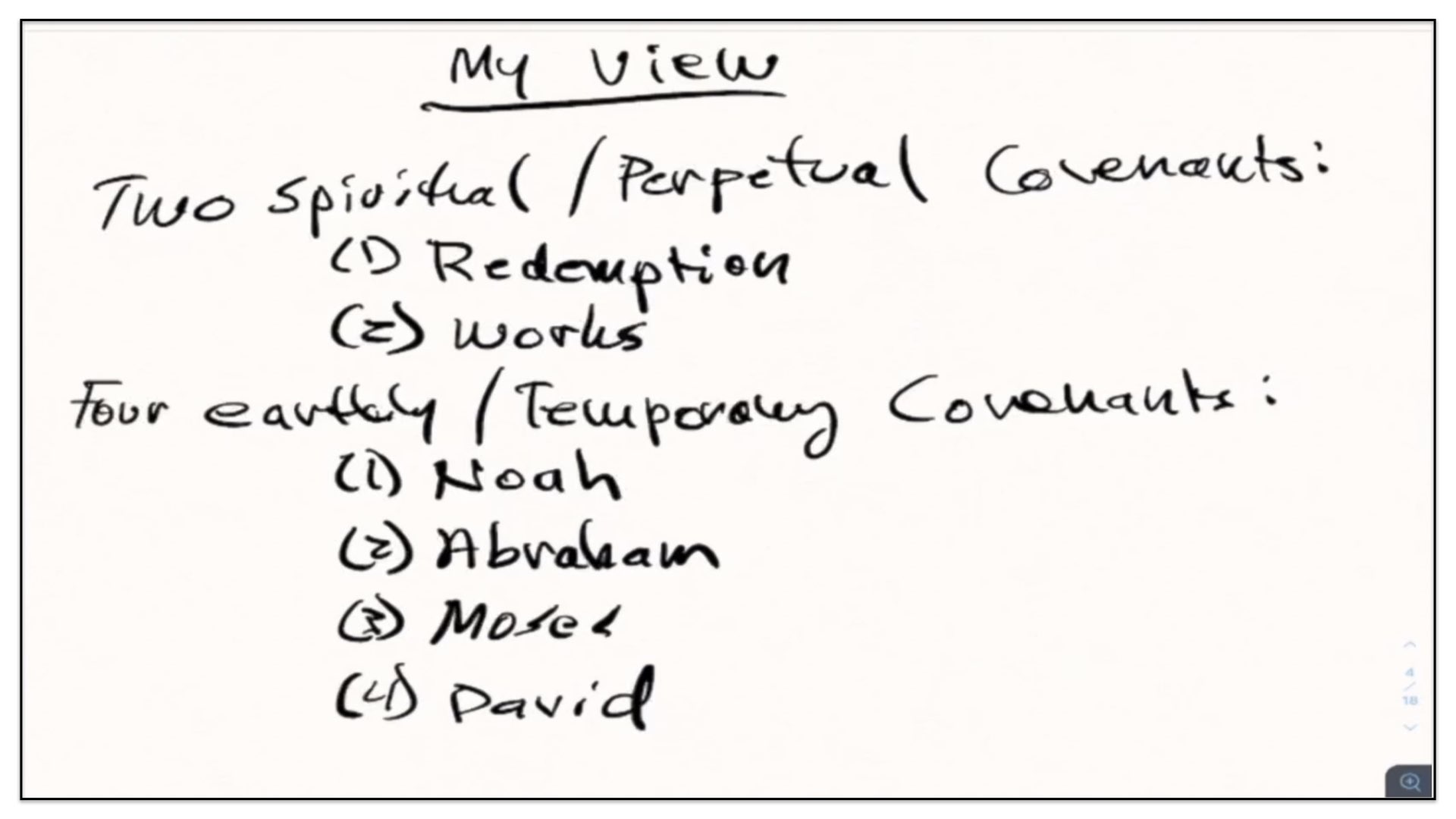
So, here’s the outline of my view. I believe that there are two spiritual and perpetual covenants. The first of these is called the Covenant of Redemption. The second is called the Covenant of Works. Unchanging Covenants. And then I believe there are four earthly and temporary covenants. These would be the covenant God made with Noah, the covenant God made with Abraham, the covenant God made with David and the covenant God made—I should back up, I’ve skipped one—covenant God made with Moses, and the covenant God made with David. In a nutshell, that’s my view outlined. That’s what I believe about the covenants: Two spiritual and perpetual covenants—Redemption and Works; and then four earthly and temporary covenants—that with Noah, Abraham, Moses and David.
Diagraming The Biblical Covenants—Two Spiritual And Perpetual Covenants (Redemption And Works)
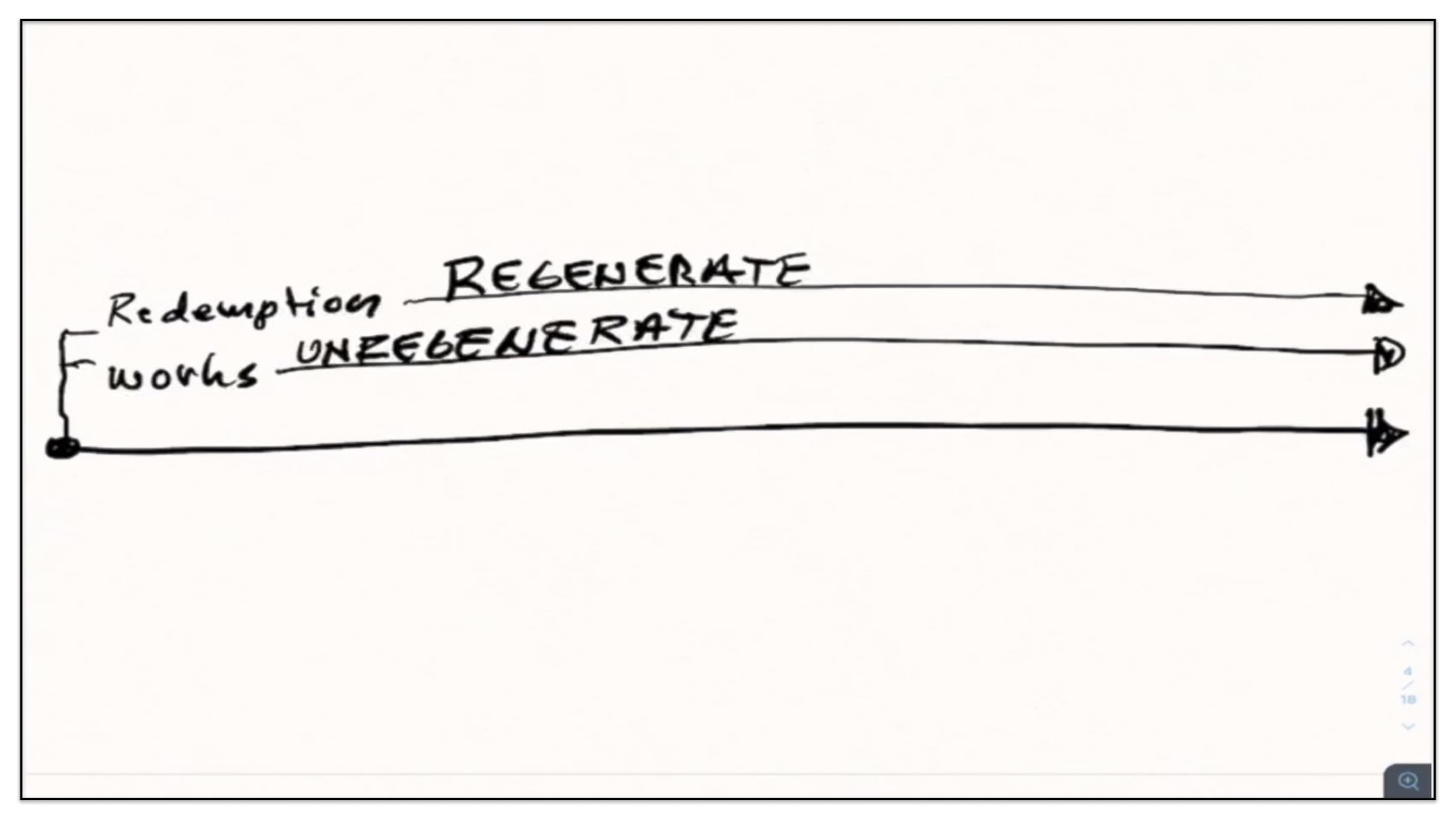
Well, let’s now take this outline and see if we can diagram it. Let me think how I’m gonna go about diagramming this. Let’s begin with a timeline. Right, let’s start with the two spiritual and perpetual covenants—Redemption and Works. And I’m going to draw them out here in our notes and our diagram. There’s the Covenant of Redemption. And there’s the Covenant of Works. And I say, the Covenant of Redemption is perpetual—it’s never ending; it’s everlasting. And so is the Covenant of works—perpetual, never ending, everlasting. Watch. Every unregenerate sinner throughout the course of history is under the authority of the Covenant of Works. And every regenerate sinner is under the authority of the Covenant of Redemption, otherwise known as the Covenant of Grace. Let’s not forget that. There’s different labels given to the Covenant of Redemption. It’s called the Covenant of Redemption, the Covenant of Peace, the Everlasting Covenant, the Covenant of Grace. If ever you hear me use those labels, I’m referring to this one covenant—the Covenant of Redemption, the agreement between the Father, Son and Spirit and under which all regenerate sinners are in relationship with God.
Just a quick word about these two covenants. So, the Covenant of Works, of course, was made between God and Adam before the Fall. God inscribed a law upon Adam’s heart requiring perfect obedience. God appointed Adam to serve as the federal head for the human race, and when Adam sinned, that sin, misery and condemnation came upon the entire human race. The Covenant of Redemption, on the other hand, is a covenant the Father has made with the Son and the Spirit for the salvation of His elect people. And the Son of God, in the person of the Lord Jesus Christ, is appointed the federal head for the elect. And while that is true from eternity, it is realized in time when the Spirit of God regenerates the soul of each of His elect people. That’s the Covenant of Redemption and the Covenant of Works. And from Adam and Eve to the last person on this Earth that will be regenerated by the Spirit of God, these covenants are continual—they’re unchanging, they’re constant and they are transcendent. They transcend all of the other covenants that I’m about to mention.
Diagraming The Biblical Covenants—Four Earthly And Temporary Covenants (Noah, Abraham, Moses And David)
Which now brings me to these other covenants. Let me say something about the four earthly and temporary covenants. I’ll just mark it out for you. I’ll use a different color, red.
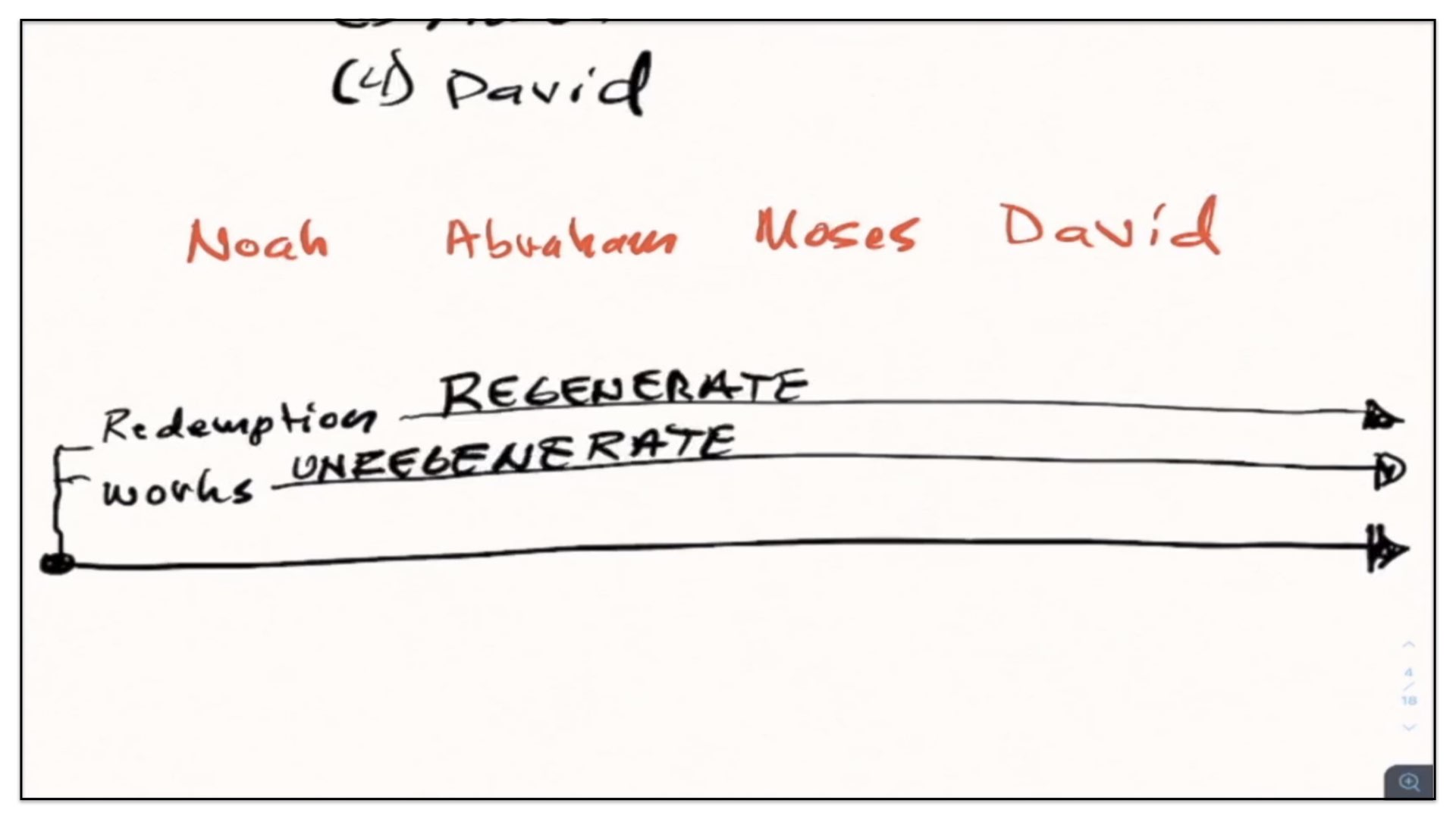
So we have a covenant God made with Noah, and then with Abraham, and then with Moses and then with David. Where do these four earthly covenants fit into the biblical framework of covenants?
All Four Covenants Are Directly Linked To The Promise Of The Coming Messiah—God The Father Would Prepare A Body For His Son From The Seed Of The Woman
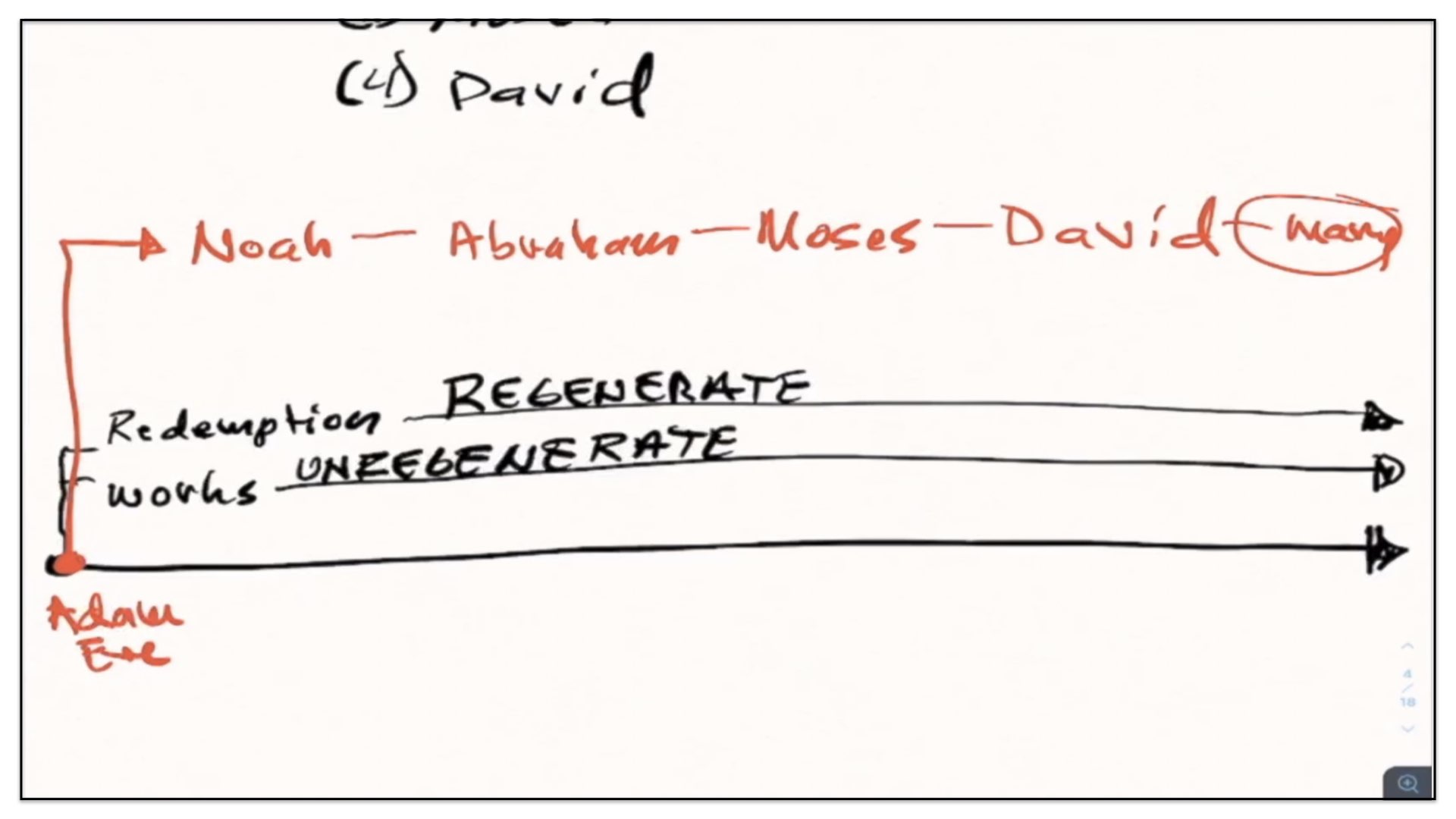
I like you to notice, all four of these covenants—and red ink or red text—are directly linked to the promise of the coming Messiah. You’ll remember in Genesis chapter 3 and verse 15, the Lord God promised that He would bring the Messiah into the world and that the Messiah would be born of a woman. And of course, this is a reference to the Son of God, Who, having agreed within the Covenant of Redemption from eternity to redeem the elect from their sins, it was necessary for the Son of God to assume a human nature (a body and a soul) that He might be qualified to serve as the Mediator and the Redeemer for His elect people. And you know, we’re told in Hebrews chapter 10, that it was God the Father Who prepared a body for His Son. Think of that! God the Father chose and designed the body that His Son would assume in the person of the Lord Jesus Christ when the fullness of time had come. Let me put it to you in this form. The DNA which would be used by God the Father to create this body for His Son would come from the family pedigree and the biological makeup of a woman, and of course, we know that woman would be Mary and her family pedigree would be linked to Adam and Eve. So capture the significance of this promise given by God in Genesis chapter 3 and verse 15—beginning with Adam and Eve, there is a family line out from which God the Father is going to prepare a body for His Son. That’s the significance of Genesis chapter 3 and verse 15. It has nothing to do with the conditional Covenant of Grace. It has nothing to do with the promise of a conditional Covenant of Grace. Rather, it is all about the promise of the coming Messiah, and how God the Father is going to prepare a body for His Son through the lineage, which leads from Adam and Eve to Mary. That is what I believe, generally speaking, about the covenants. It’s all linked to this promise of the coming Messiah. It has nothing to do so much with a covenant. There’s no covenant being made here. It’s just the promise of the coming Messiah.
God The Father Chose To Honor The Family Line Through Which He Would Prepare A Body For His Son—The Jewish Race Was Created And Instituted A Nation, Enriched With Many Earthly Privileges And Blessings
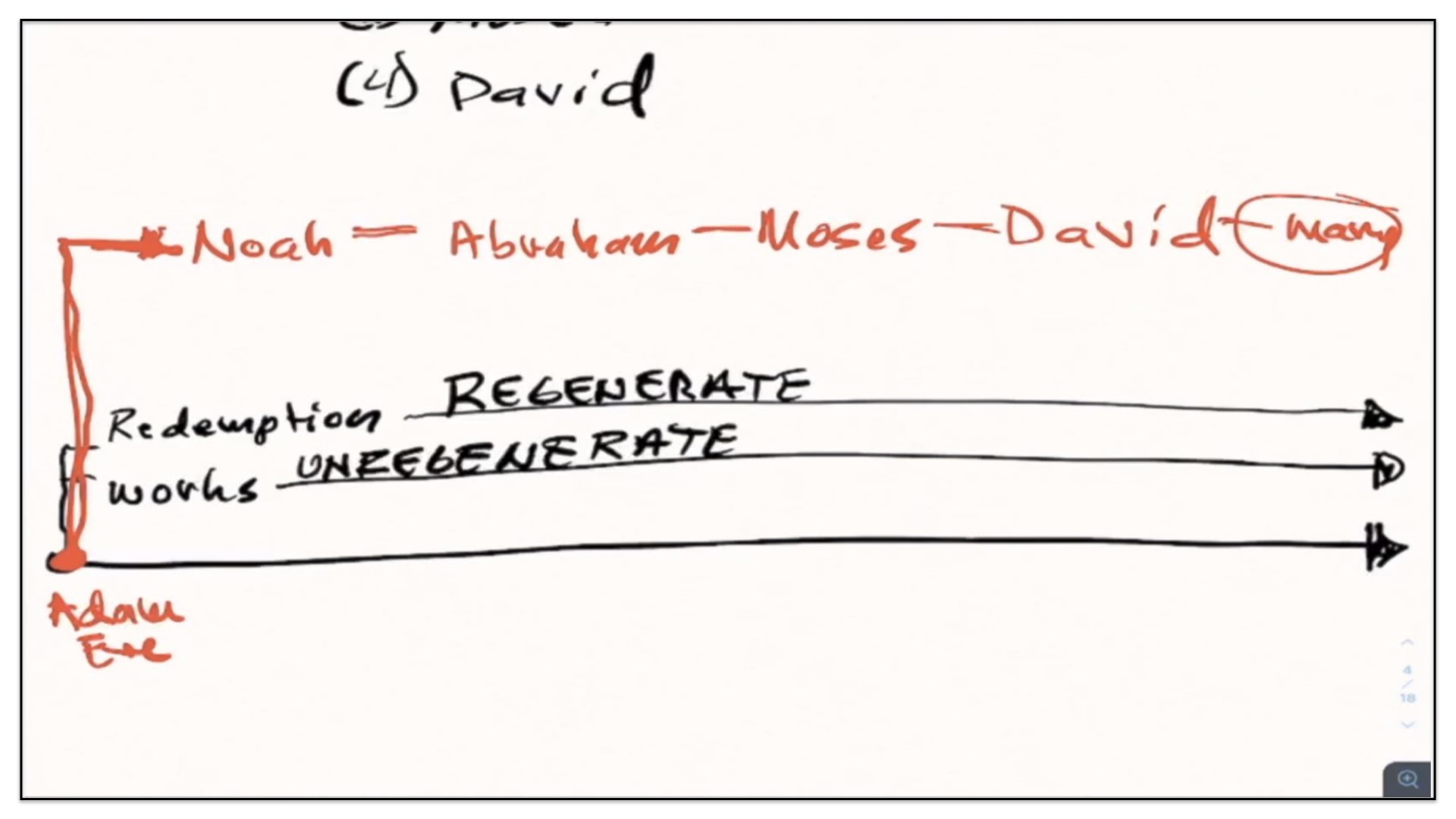
Now please watch this. It’s important. God chose to honor this family line through which the Messiah would be born. And that’s the reason why the ancestors of Christ are recorded in the Old Testament scriptures. Those men and women who belong to the lineage of Christ are given a prominent place in the biblical narrative. And what I’m arguing is this—the honor that God bestowed upon these people is based upon the fact that God has singled them out as a family line, as the bloodline, which links to the coming Messiah. You know how it is! You do things for the members of your own family that you would not do for the members of another family. You honor the members of your family. And you see, that’s what God did with the members of the family that would be the bloodline leading to the Messiah. That’s the whole reason why there’s a Jewish race that God created. He did this and He blessed them because they were the bloodline of the coming Messiah.
Now, I would like to point out to you four things very briefly on what I’ve tried to diagram for you concerning these four earthly covenants.
All Four Covenants Were Made With Those Who Belonged To The Family Line Of The Messiah—The Focal Point Is On The Biological Lineage Through Which The Messiah Would Be Born
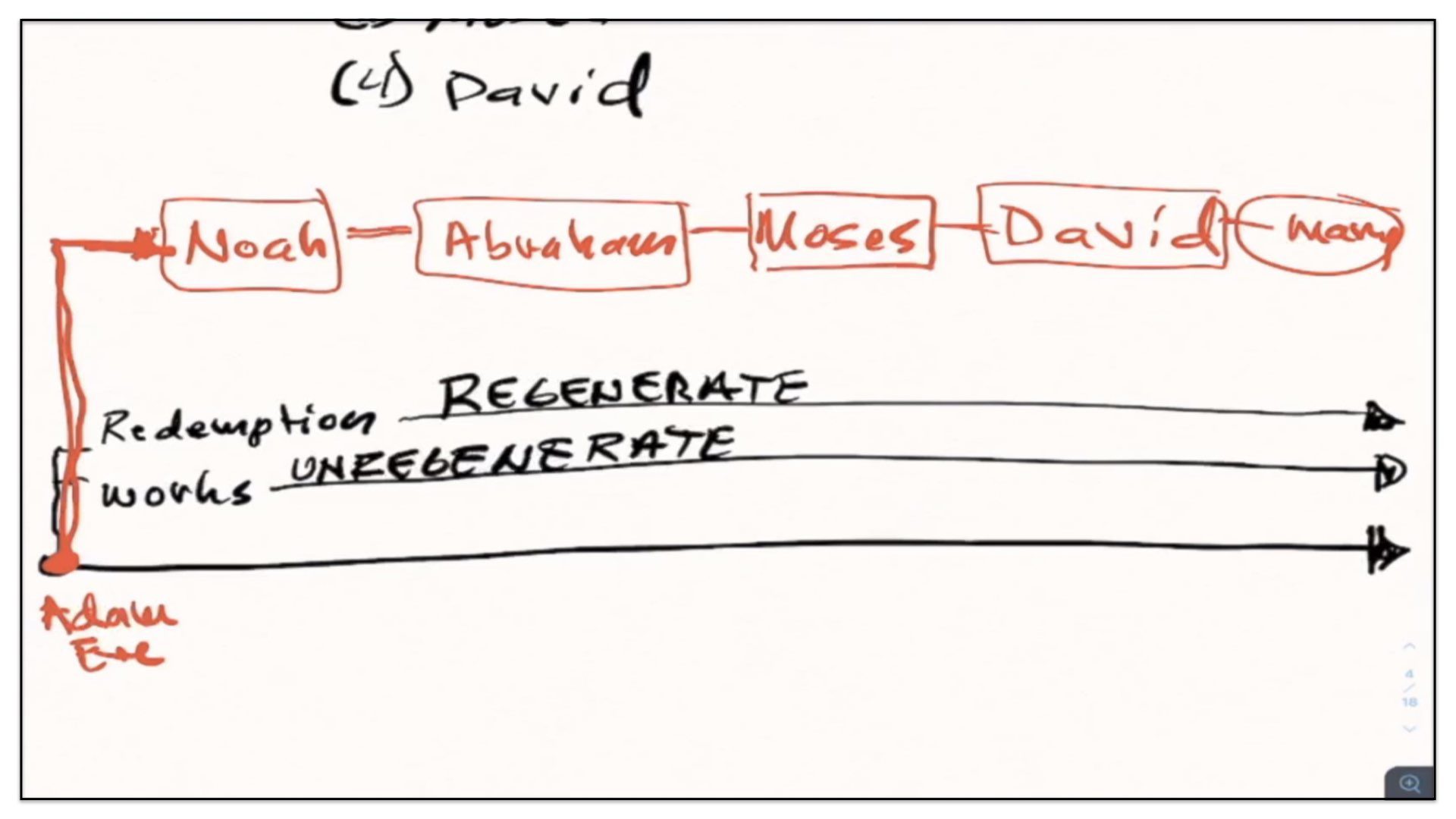
Here’s the first thing. Notice, all four covenants were made by God with those who belong to the family line of the Messiah. Do you know that Noah, Abraham and David are ancestors to Christ. “But.” you say, “What about Moses?” Well, Moses actually was not an ancestor to Christ. The family line went a different direction. However, the covenant God made with Moses was on behalf of the entire Jewish race—the Jewish people as a nation. And of course, it was through the Jewish race that the Messiah would be born. So, that’s the first thing I want you to notice about these four earthly covenants. This is what they all have in common. It’s all linked to the bloodline of the coming Messiah. These are the men God chose to make covenants with, or the group of people, or family members.
All Four Covenants Were Earthly In Nature—Abraham’s Family Would Become A Great Nation, Possessors Of A Land Flowing With Milk And Honey
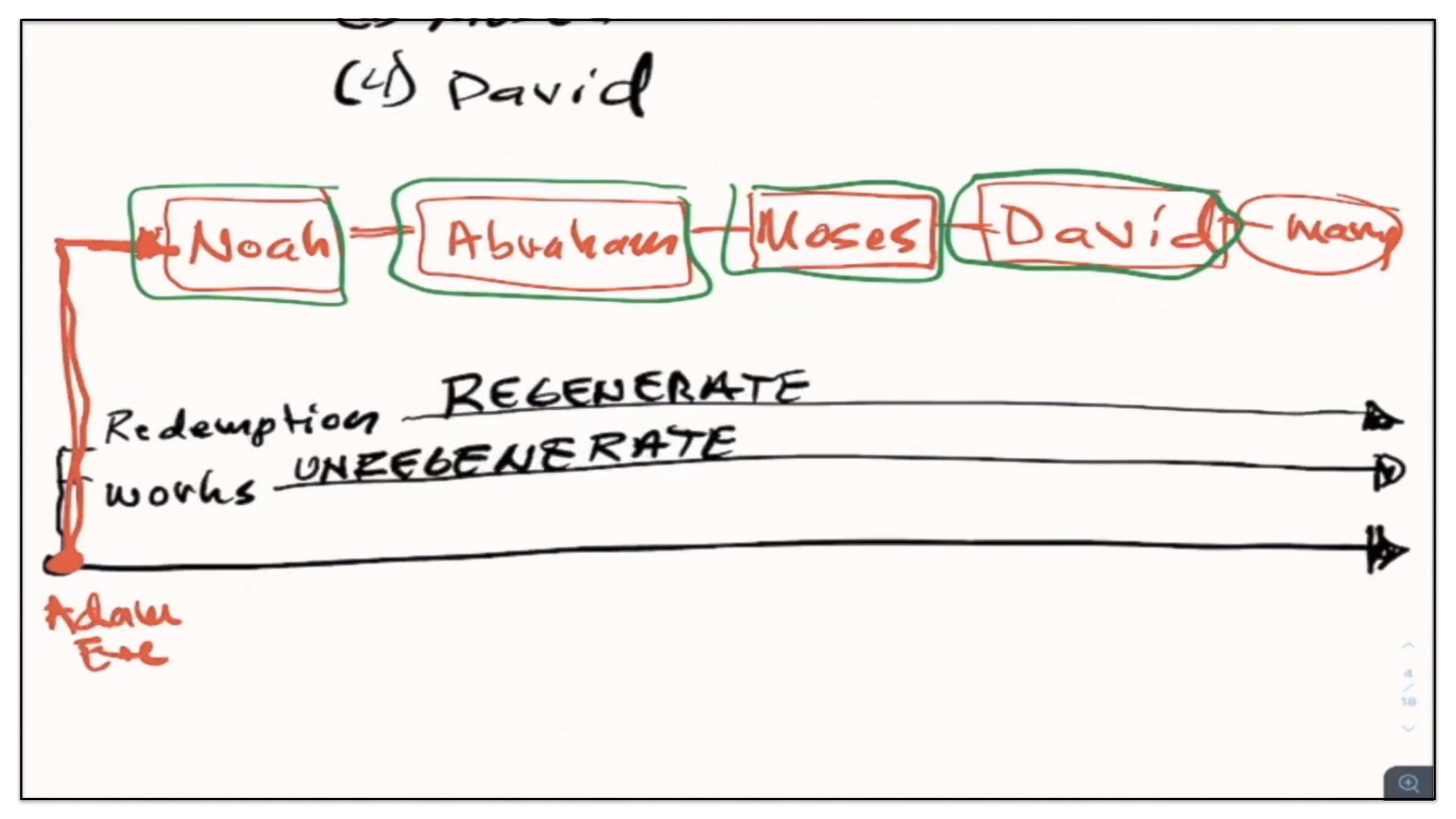
The second thing. I’d like you to notice, all four covenants are earthly in nature. That is, they all promise earthly blessings. The covenant God made with—let me just change the color pen—the covenant God made with Noah promised the earthly blessing of not having a flood of waters destroying the world again. It’s an earthly covenant. The covenant God made with Abraham promised his family would become a great nation and they would live in a land that flows with milk and honey. The covenant God made with Moses, or with the children of Israel as a nation, it promised great privileges and blessings as they took possession of the land that was promised to Abraham. And then, the covenant God made with David—it promised a coming seed who would rule in righteousness as none of their kings ever did. And indeed, when the Messiah was born, He was the King of the Jews, and though He sat on no earthly throne, yet He did reign in righteousness, perfectly obedient to the heart law, and therefore the blessing to the people of the nation of Israel as that King above all kings among them.
All Four Covenants Point To The Coming Messiah—The Covenant With Noah To The Second Coming Of Christ; The Covenants With Abraham, Moses And David To The First Coming Of Christ
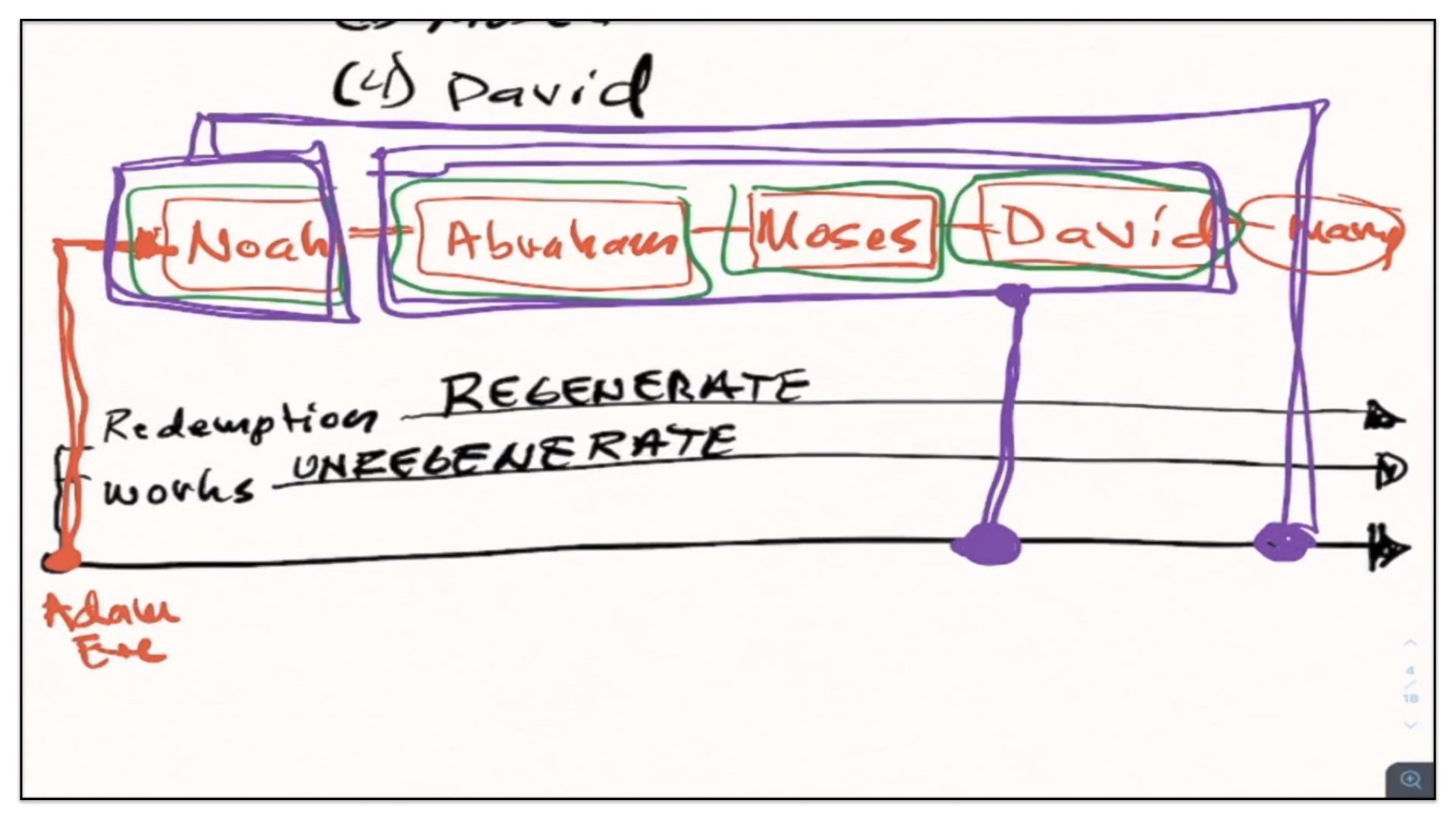
Now, the third thing I would like you to notice about these four covenants—all four covenants point to the coming Messiah. Take, for instance—I’ll change the color pen, purple—take for instance, these last three earthly covenants—Abraham, Moses and David. These covenants point to the first coming of Christ—the first coming of the Messiah. However, the earthly covenant God made with Noah, it points to the second coming of the Messiah. “But how so,” you say. “Doesn’t the covenant God made with Noah only promise that God will not again destroy the earth with a worldwide flood for man’s sake?” And of course, yes, that’s true. God makes that promise. But if you read carefully—I believe it’s Genesis chapter 8—if you read carefully, the promise God gives, He qualifies it by explaining that this covenant will be active until the end of the current form in which this earth exists. And then, if you were to read the letters of Peter, Peter points out that when the Lord Jesus Christ will come again, He will with fire destroy this earth and then remake it. And you see, therefore, you have in the covenants made with Abraham Moses and David—it points to the first coming of the Messiah; whereas the covenant God made with Noah points to the second coming of the Messiah. It’s all about this promise in Genesis chapter 3 and verse 15 of the coming Messiah, whether it be His first coming or His second coming.
All Four Covenants Were Temporary In Nature—They Terminated With The Birth Of The Messiah
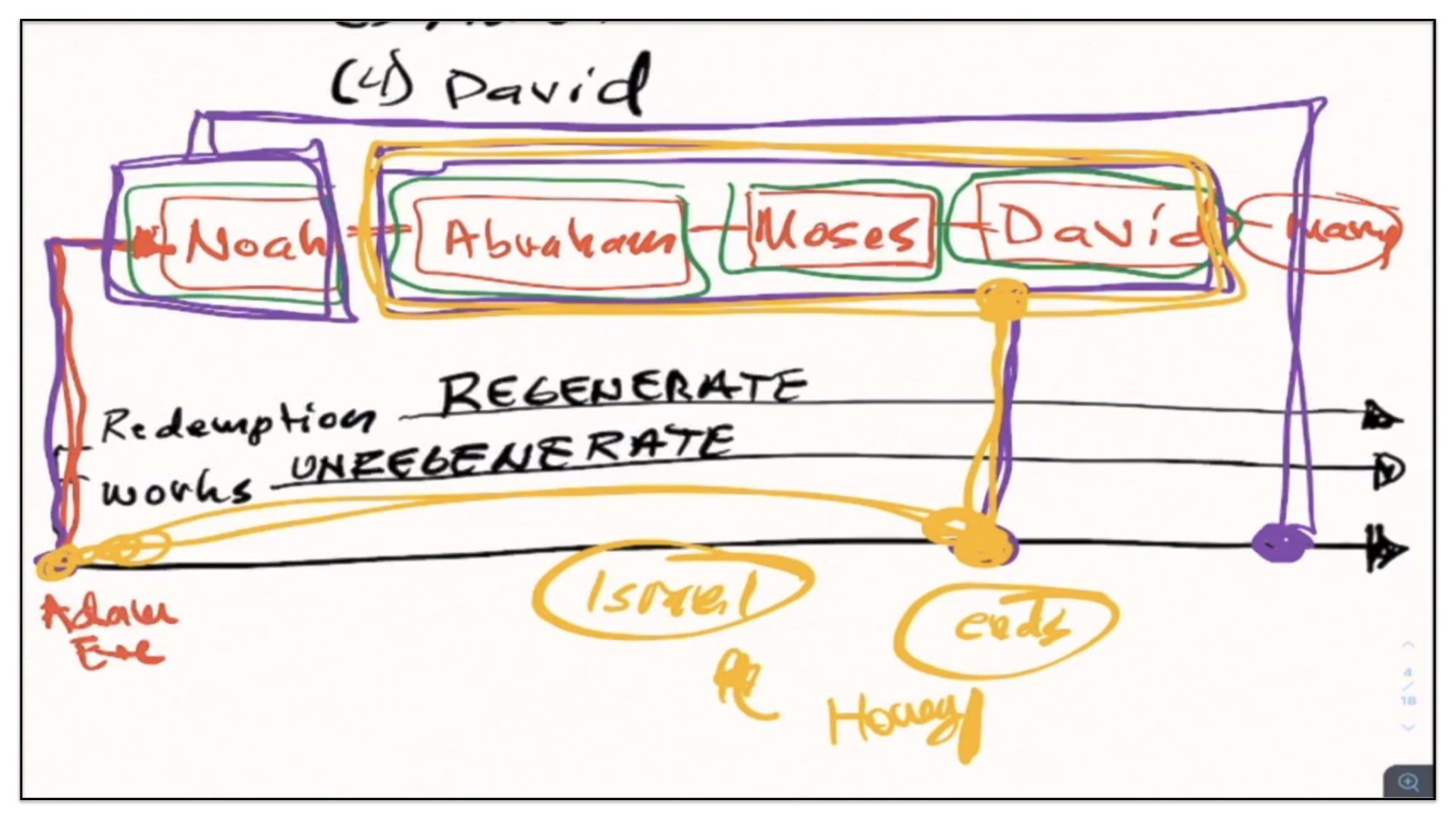
The fourth and final thing I want you to notice about this diagram of the covenants—notice, all four covenants terminate when the Messiah comes. Let me change the color pen. Let’s use orange. Take these last three covenants—Abraham, Moses and David. These covenants terminated, or they were brought to an end, when Christ came the first time into the world. In fact, God even brought to an end the special favor He had set upon the lineage of Christ for the previous 4,000 years. For those 4,000 years, God set this special privilege upon the bloodline of Christ. And that’s the importance, of course, of the nation of Israel. They were the bloodline of Christ. But when the Messiah comes into the world, the lineage of Christ ends. The Messiah has come and God therefore brings an end to honoring that bloodline. I hope you see that the covenants of Abraham, Moses and David, along with the nation of Israel and the great privileges God bestowed upon them—it all came to an end when Christ came into the world; when that promise was fulfilled from Genesis 3:15. And likewise, when you take the covenant God made with Noah, that Covenant is active until Christ returns. And when Christ returns, the covenant God made with Noah will be terminated. And Christ will then burn up this world with fire. And He will create a new heavens and a new earth. Now, four earthly covenants, two spiritual perpetual covenants.
A Word About The New Covenant—an explanation of the Covenant of Redemption to the Jewish people living at the time of Christ and the Apostles, in the context of the Mosaic Covenant and its laws, and the Jewish people as a nation (Is God Casting Away The Jewish People As A Race, With Their Earthly Covenants Terminating And Their National Identity Ending?)
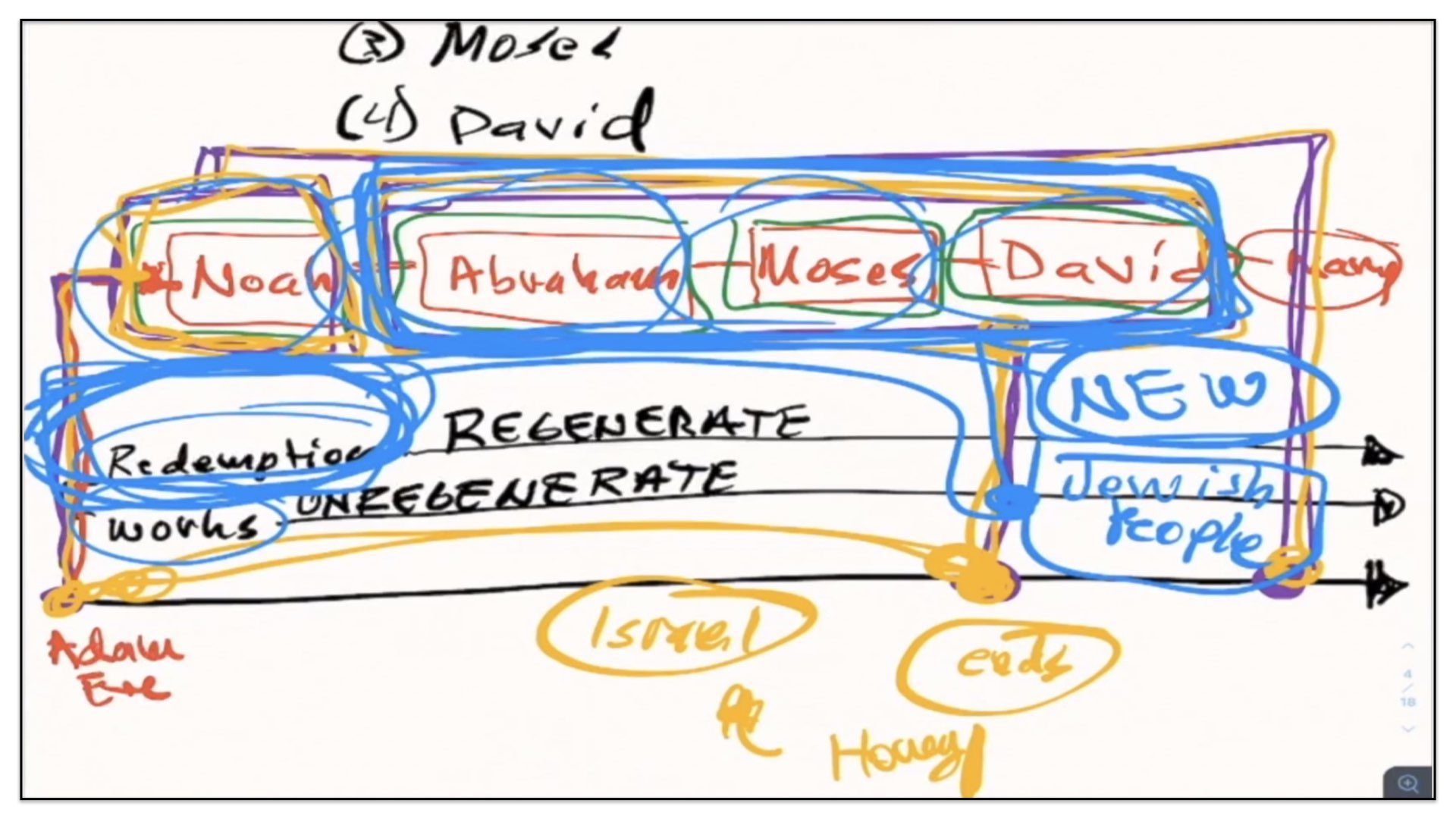
But before I close, there’s one other thing I need to point out to you. Let me choose a different color pen, a lighter color, blue. Watch. In addition to the two spiritual and perpetual covenants, and in addition to the four earthly and temporary covenants, there is also something called the New Covenant. Now, where does the New Covenant fit into this framework? Of course, the New Covenant is referred to by the Prophet Jeremiah. The Lord Jesus Christ speaks of it. The Apostle Paul refers to it. And it is therefore only right that we ask, “Where does this covenant fit?” Well, you’ll notice, I have not included that covenant in the list of the spiritual or earthly covenants, and I’ll tell you why. Because I do not believe, technically speaking, the New Covenant is a separate covenant. Remember, a covenant is an agreement between two or more people, with certain obligations binding them together. I do not believe the New Covenant is that. So, what do I believe?
Listen carefully to me. I don’t want you to misunderstand me. I believe the New Covenant is an explanation of the Covenant of Redemption to the Jewish people, in the context of the previous covenants prior to the birth of Christ. Now that Christ has come into the world; now that the Messiah has been born; now that the nation of Israel has come to an end and the covenants have ceased, they’ve terminated; what does that now mean? When Jeremiah and Christ and Paul speak of a New Covenant, they’re talking about an explanation of the Covenant of Redemption and how that relates to the Jewish people within the context of these things that God had established with the Jewish people.
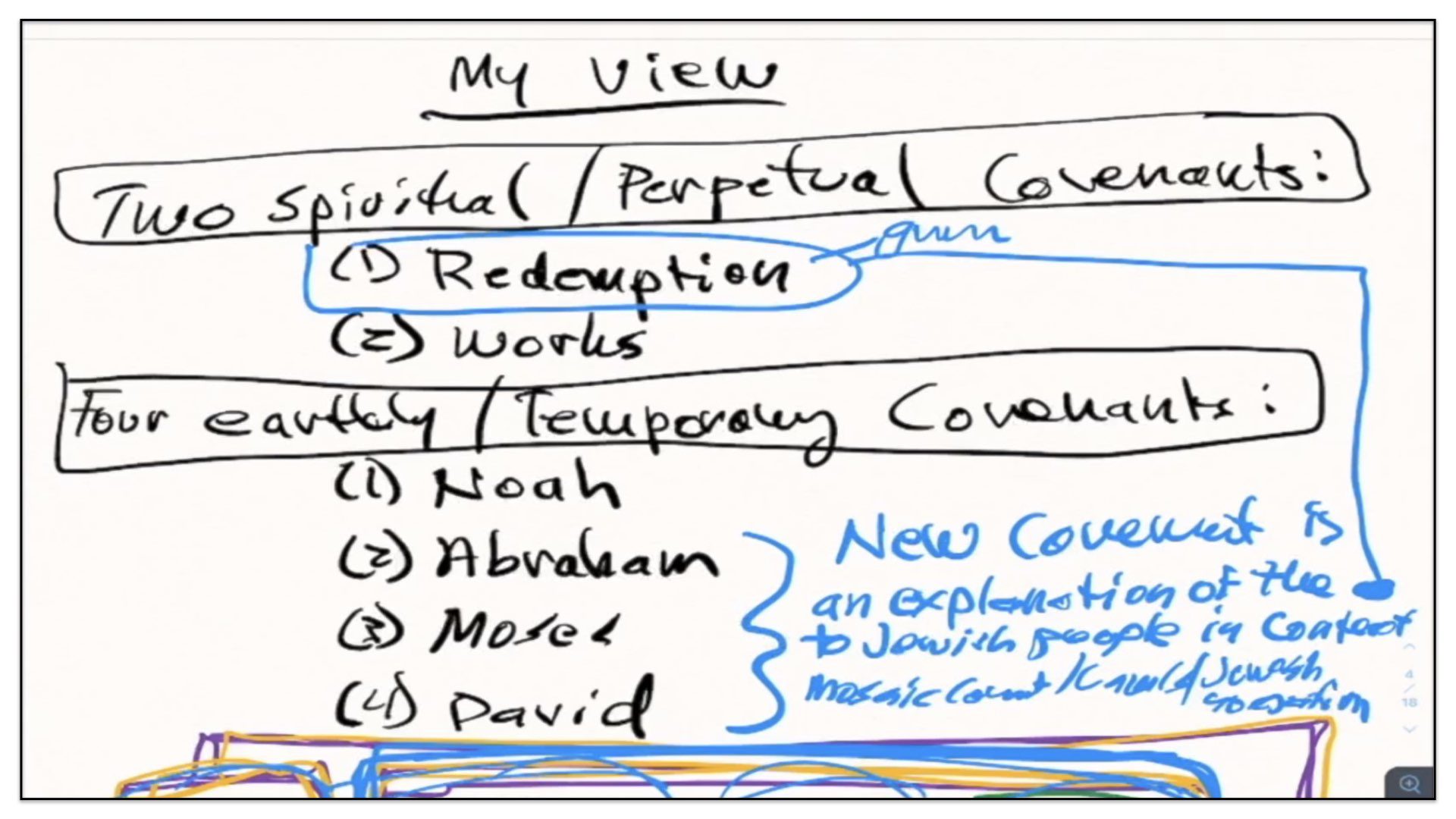
Let’s put that in our outline. I would therefore say, the New Covenant is an explanation of the Covenant of Redemption to the Jewish people living at the time of Christ and the Apostles, in the context of the Mosaic Covenant and its laws, and the Jewish people as a nation. I don’t believe it’s right to say the New Covenant is the Covenant of Redemption, like the 1689 Federalists will say the New Covenant is the conditional Covenant of Grace. I don’t believe it’s one and the same in that way. Rather, I believe the New Covenant is an explanation for the Covenant of Grace—or rather, for the Covenant of Redemption, which I also call the Covenant of Grace—it’s an explanation specifically to the Jewish people, not the Gentiles, but to the Jewish people, as now their nation and their lineage leading to Christ and their covenants and their laws and their ordinances have come to an end. What then does the Covenant of Redemption mean, if all of that has now ended? That’s the idea.
A Final Word
That’s my basic view of the covenants: Two spiritual and perpetual covenants—the Covenant of Redemption, the Covenant of Works; four earthly and temporary covenants—that with Noah, Abraham, Moses and David. And then the New Covenant, which is an explanation of the Covenant of Redemption to the Jewish people living in the days of Christ and the Apostles, within the context of the Jewish nation and the Mosaic Covenant and its laws and ordinances that have now been terminated as a result of the Messiah coming into the world. That, my dear friends, is my view in a nutshell.
And I know the time has gone. I don’t even know how long I’ve been going in the study. I can only imagine it’s a lengthy amount of time. My throat’s even hurting. Your ears are probably hurting. I’m sorry I’ve gone so long, but I don’t apologize for the content of the teachings. This has been on my thoughts for the last few weeks, and because I’m out of time on preparing other types of studies with the current busy schedule I keep, then I’ve decided just to share with you these thoughts that have been fluid in my mind and just hoping it’s gonna be a blessing to you. Hey, listen if you have any questions based on the things I put out, I hope you make contact with me. I’d be more than happy to talk with you and discuss these things.
I want to wish upon you every blessing in the Lord. Next week, I’d like to return to this subject and I would like to go a little bit more in detail with my thoughts or explanation, particularly with these earthly covenants. I’d like to focus on—I’ve spend so much time in previous studies on the two perpetual covenants, I don’t need to spend much time there, rather—I’d like to spend some special time with the earthly covenants and lay out some things for you to consider, and in connection with the viewpoint I’ve put across in this study. Alright, like I said, I wish every blessing in the Lord until we meet again.
Jared Smith served twenty years as pastor of a Strict and Particular Baptist church in Kensington (London, England). He now serves as an Evangelist in the Philippines, preaching the gospel, organizing churches and training gospel preachers.
Jared Smith's Online Worship Services
Jared Smith's Sermons
Jared Smith on the Gospel Message
Jared Smith on the Biblical Covenants
Jared Smith on the Gospel Law
Jared Smith on Bible Doctrine
Jared Smith on Bible Reading
Jared Smith's Hymn Studies
Jared Smith on Eldership
Jared Smith's Studies In Genesis
Jared Smith's Studies in Romans
Jared Smith on Various Issues
Jared Smith, Covenant Baptist Church, Philippines
Jared Smith's Maternal Ancestry (Complete)




